Sarah Clarkson's Blog
November 10, 2021
Advent Companions: My Favourite Resources for the Watchful Season
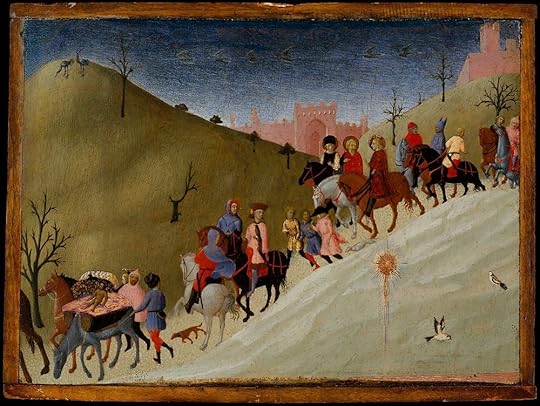
The Journey of the Magi by Stefano di Giovanni Sasseta
The leaves are only just really falling but I’m planning Advent early this year. Last year, too flattened by pregnancy and dismayed by lockdowns and loneliness, I found myself unable to sustain the watchfulness I so desired. There are seasons, there really are seasons and sometimes God knows that the most needed thing is just to keep breathing. But this year, I am so excited to engage afresh with this special season in the church year, one that, in many ways, most poignantly explores our grittiest realities and our deepest hopes. Advent allows us to really acknowledge, to mourn and confront the huge darkness that haunts our lives in the fallen world. But Advent also beckons us, commands us, even, to follow the great light, to search down the star that has suddenly broken in upon the shadowlands. There is a sort of gentle imperative to this season, an invitation to deeply consider the true nature of our breathing, hungering selves here on earth.
And oh, I need it. My heart needs the sojourn and the watchfulness; I need to learn afresh what it means to watch, to wait, to listen with expectation, to hush the many-voiced world so that I can hear the one voice singing that ancient song of healing into the shadowlands here.
I have always found, though, that I need help in being quiet, in keeping watch. I need the scaffolding, the companionship, the hand outstretched to steady me by image, word, poem, and art. The resources below are books, studies, anthologies, and stories I’ve used for years. I pretty much republish this post every year, so if you’ve followed me for awhile, you’re sure to recognise the old favourites. But I add a few new ones as I can and I’m adding in the new books I’m finding to use with my little ones as I go.
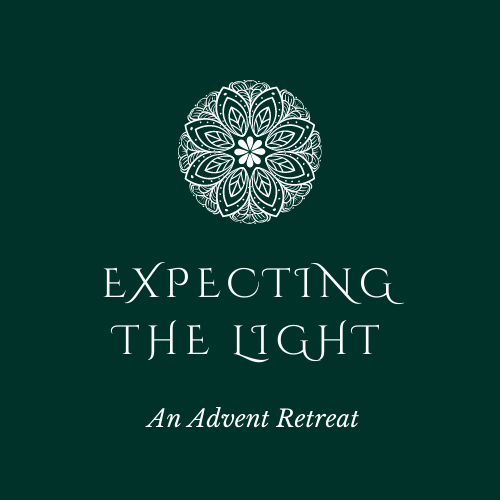
I should also mention that I will be hosting an Advent retreat this year. I hosted my first one last year and, despite the collapse of my bookshelf halfway through, I found such joy in cultivating a space of prayer and community and beauty as a sort of wayside chapel from which to begin Advent. That’s how I picture it, this retreat, a chapel with candles lit and a voice speaking comfort from the kindly shadows. I want to offer beauty, courage, companionship as the pilgrim season of Advent begins. This year, I’ve found a new live event platform and am so delighted to be able to create a real retreat of four separate sessions. I’ll be hosting four sessions in the first week of Advent, exploring the themes of yearning, annunciation, preparation, and welcome. The sessions will be live video events, but the videos will be available indefinitely so you could watch them each day or save them to watch one per week. Each session will also include a set of notes with discussion questions and resources for further exploration of the topic. Go HERE to find out more or register for the retreat.
(NOTES:
Go to the end of the post to see the list of resources I’m using this year with my children.
There are affiliate links in this post. Most, presently, go to Amazon as I haven’t had time to change them all, but I’m creating a bookshop storefront on Bookshop.org where you can find many of the titles listed here and your purchase will support small, independent booksellers. I’m slowly changing all my links to redirect to Bookshop.org instead of Amazon.
Go HERE to find most of the titles below in one list on Bookshop.org. )
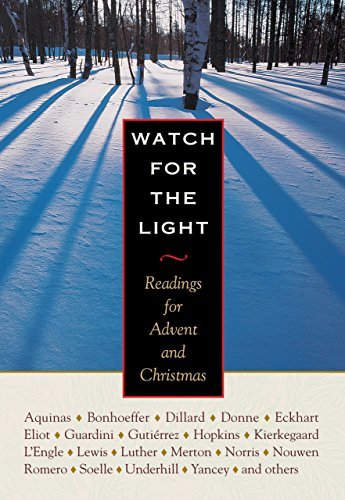
I first found this years back when one of its most arresting passages was quoted in a daily Advent devotional I received by email. Having found these words - But round about the horizon the eternal realities stand silent in their age-old longing. There shines on them already the first mild light of the radiant fulfillment to come. From afar sound the first notes as of pipes and voices - I hungered for more of the same. And my hunt led me back to this collection of stirring Advent contemplations, one a day through Epiphany. For a book that sets you in the strong, clear light of Advent as a season of preparation, even of penitence, this is the best. The readings here aren't meant to evoke nostalgia or even comfort (yet), but to help a reader come wide awake, to take account, to consider what it is she hopes and what the coming of that hope means to the here and now. For 'preparing a way for the Lord' in my heart in this season, this book has long been a brave and resourceful companion.
God with Us, edited by Greg Pennoyer and Gregory Wolfe
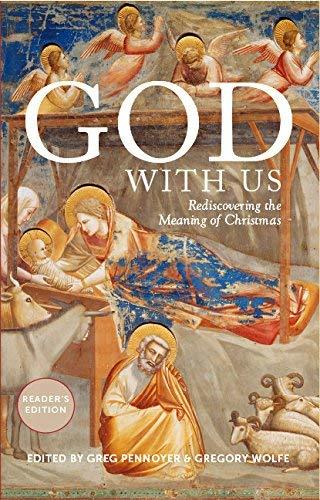
This book is a luminous companion, prepared by the faithful and creative minds behind the literary Image Journal. This book offers carefully selected pieces of art, daily Scripture readings and prayers, and daily Advent devotionals, each week written by a different Christian writer or pastor. This is an ideal Advent devotional book as it offers a compact but rich contemplation, short enough for a snatched quiet time, but rich enough in image and idea to shape one's thoughts for the whole day. It's a world of a book, a twilit, contemplative, Advent world.
The Art of Advent: A Painting a Day from Advent Through Epiphany by Jane Williams
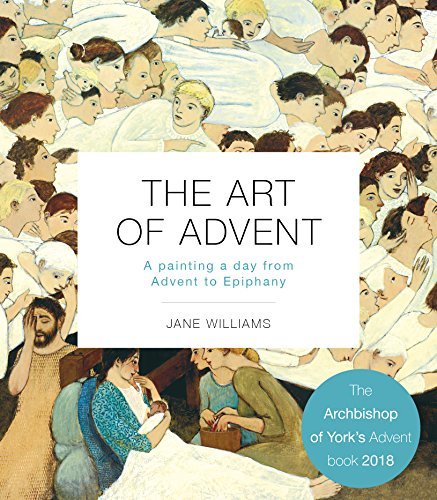
This book is just out, and I ordered a copy the minute I found it. It’s little, which means it fit in my bag for an overnight weekend with ease, but it contains a collection of art to startle and hush, to demand attention and aid contemplation, with reflections by Jane Williams, an author and podcaster known here in England. I am so excited to savor this book and have already loved the first reading, themed on light and darkness, centred on Blake’s startling image of the Ancient of Days.
Waiting on the Word, by Malcolm Guite
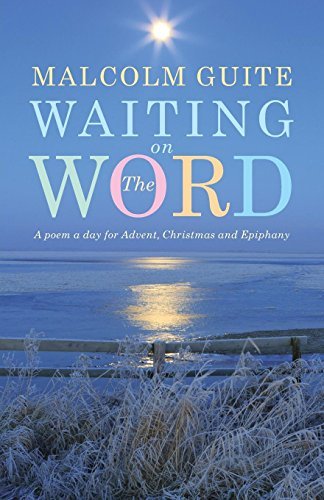
Poetry, as Owen Barfield insightfully claimed, can bring about 'a felt change of consciousness', a process that I think is at the heart of Advent celebrations and one that is masterfully crafted for a reader in this collection of Advent poems by Malcolm Guite. Guite's Lent collection has been my companion for the past two years, and the Advent one is a new favourite. Guite doesn't just give you a poem to read, he guides you into the heart of the woven words, words that can truly shift your sight from boredom to wonder, from discontent to thanks, from discouragement to a newly-kindled hope. Combined with his own radiant sonnets, this book is a gift of lyrical beauty and devotional quiet.
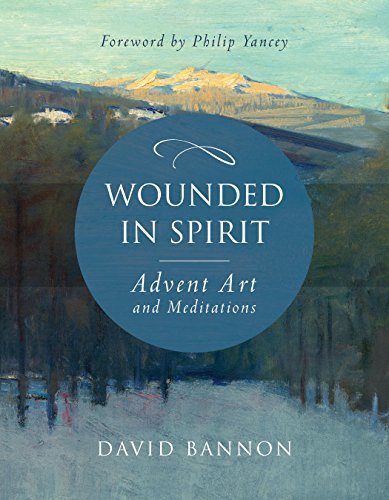
Wounded in Spirit: Advent Art and Meditations by David Bannon
I’ve come to love this quiet, grieved, book of hopeful pilgrimage. Written by a man who lost his daughter, it bears the depth of Advent’s darkness; the long shadows in which we sit with questions and a torturous quiet. It’s very hushed, there is nothing triumphal about it and at moments, it can be bleak as it allows you to sit with the grief you may find in this season. But it is richly beautiful and it thrums with a real and quiet hope as it explores the art that emerged from the darkness in the lives of different creators. What does it mean to hope, to reach forward, to walk in faith while still in the darkness? This Advent resource leads us into that faithful way.
Haphazard by Starlight by Janet Morley
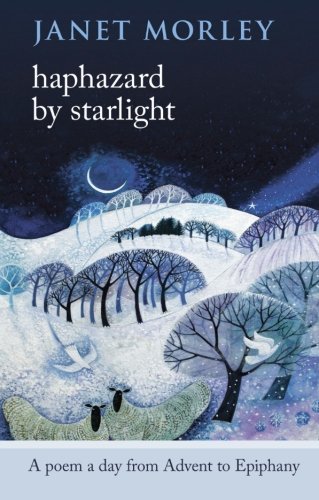
This is a similar collection to Guite's, one I have just discovered. It comes highly recommended by my tutor here at Oxford, and we are using some of the poems listed within for an Advent poetry discussion group. I love the way this book introduces me to poems I would never have discovered on my own. And, I mean, the title. Splendid thing.
Advent with Evelyn Underhill, compiled and edited by Christopher Webber
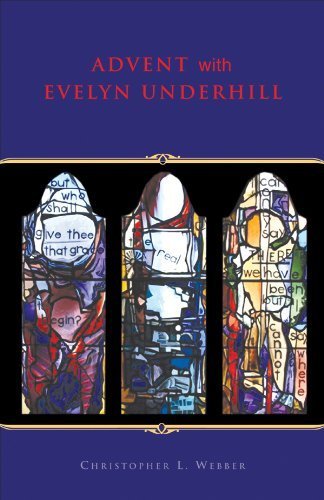
I make no secret of my love for Evelyn Underhill. Her confident, motherly voice in writing, not to mention her excellent scholarship on contemplative prayer and Christian mysticism, has shaped my devotional life in countless ways. This collection of daily Advent readings has been culled from her many devotional works. These are short, accessible, luminous and for me, powerfully formative readings you could peruse in a spare 5-minutes. I've taken this book along to the airport to read in the waiting area and the pithy, wondrous tone always startles my soul awake even in the midst airport craze.
The Reed of God by Carol Houselander
This gentle meditation on Mary’s response and role in opening her life to the coming of Christ has deeply convicted and encouraged me. Devotional in tone, creative, a book to help a reader excavate his or her heart in the shadowland season of Advent.
The Glorious Impossible text by Madeleine L’Engle, OR The Nativity , text by Geraldine Eischner, art (in both) by Giotto
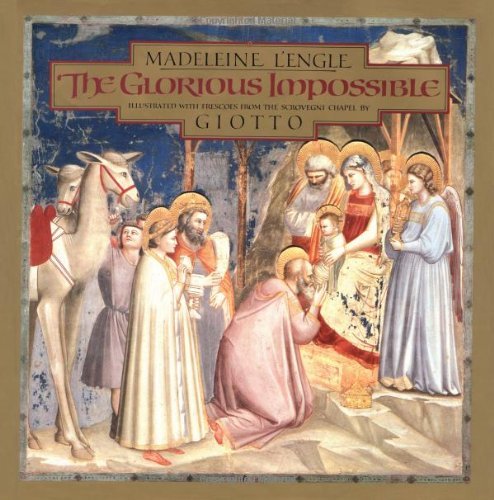
Every Christmas of my childhood, Giotto’s art arrested my eye in this book, brought out only for the Christmas season. The gentle or awed or anguished faces, the faded gold, the strange figures embodying a story I knew well, making it new and strange, and yet closer again… I have encountered few pieces of art that so capture the ache and wonder, the pain and passion of Christ's coming into this world. I think that art arrests the mind in a different way than words, allowing our eyes a fixed contemplation in which our imaginations 'see' the story of Christ afresh. In the book I grew up with, Madeleine L’Engle’s lovely prose accompanied the pictures and if you can get your hands on a copy, I highly recommend it. The contemporary (and in print) version by Geraldine Eischner is good too.

A Christmas Story by Brian Wildsmith
I love to steep my little ones in different illustrated tellings of the Christmas story and journey and in addition to the title below, this gorgeously illustrated book is one of our favourites to explore. The renaissanceish beauty and contemporary whimsy of it is amazing. It’s so lovely.
The Nativity by Julie Vivas
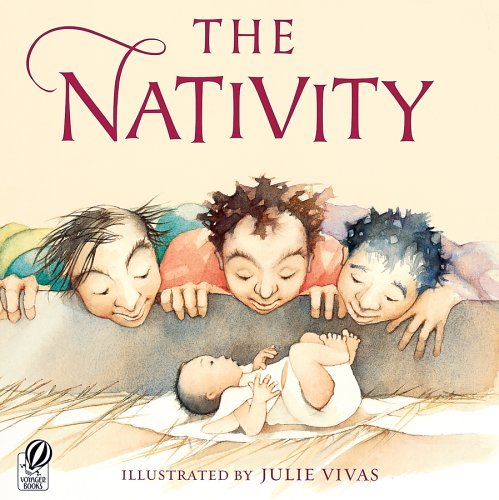
Lilian received this as a christening gift (I think) and I have been absolutely enchanted with it. Just the simple, Bible text recounting the story of the annuncation and of Jesus’ birth, yet with illustrations so magical I find myself smiling as I read. The sweeping, earthy, humorous images in their gangly contours, the lively, joyous faces, the delight of seeing the annunciation depicted as Mary and the angel sitting at a table over coffee, I just love the humanity and humor of this story and the true, pure wonder it conveys at the same time.
I Saw Three Ships by Elizabeth Goudge
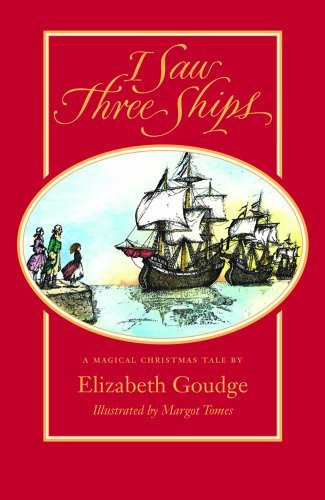
I only grow in my love of good short stories. This one, in a simple, tightly woven little tale manages to tug hard at every hopestring in your heart, combine childhood Christmas delight with grown-up yearning, and bring it all to an end that, I must admit, brought tears to my eyes the first time I read it. It's a gem of a story, an emerald gem, bright with all the life of Christmas if you ask me.
A Christmas Book also by Elizabeth Goudge
A collection of Christmas short stories, some excerpted from her longer novels, some written purposefully for the book. I love that I can sit down for half an hour with a cup of tea and finish a whole, small tale that yet makes me feel I’ve sojourned in a good, spiritually nourishing place. The lively and eccentric characters, the humour, the spice of mystery, the presence of the sacramental in the lovely, all the usual goodness of Goudge comes as a gift in these small stories.
Home for Christmas edited by Miriam LeBlanc, illustrated by David Klein
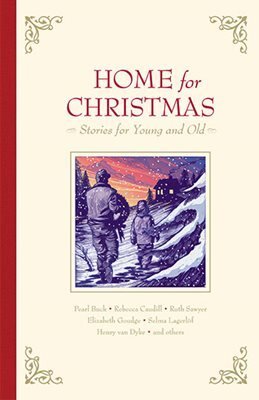
I’ve so enjoyed the stories in this reissued hardback collection of short stories from the lovely Plough Publishing. Brief, very read-aloudable tales by authors I adore such as Elizabeth Goudge. Poignant, tender, lovely.
Christmas in my Heart by Joe Wheeler
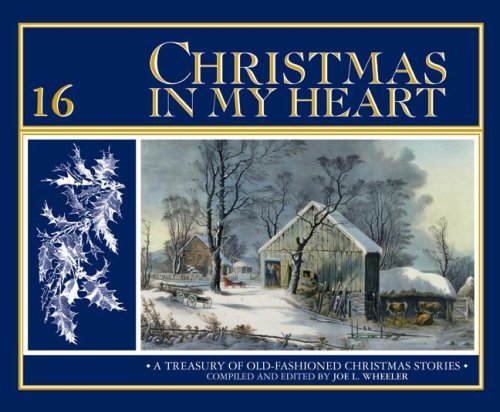
Joe Wheeler is one of the best and oh so dearly beloved anthologists we have in the States and I was deeply privileged to have him for a mentor. I love these Christmas books, collections he has culled from the reading of thousands of old books. My family used to read these aloud in the evenings during Advent season… and we might have had bets on how quickly mom would tear up. Now I’m the one tearing up… they are sweet, funny, good, family-affirming, old-fashioned tales to enrich the season.
The Silent Bells by William MacKellar
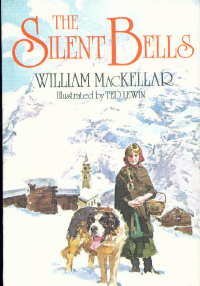
A lovely friend sent me this book last year and it has joined my stack of favorite Advent short stories. Set in the Swiss Alps, named for a set of cathedral bells that have never been heard but are prohesied to ring with the coming of a certain gift at the Christmas Eve service, the book is the tale of little girl's generous heart. It's a dear story, one that stirred my heart. I look forward to reading this to Lilian.
Midwinter Carols v. 2 by Joel Clarkson
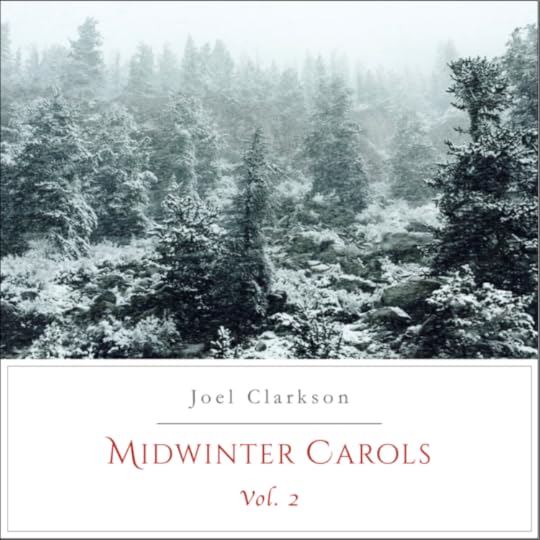
My wondrous brother Joel just released an album of tender, lively, oh so richly woven but oh so quietly rendered carols for Advent and Christmas. I’ve had this album on repeat in the last days with Lilian and it brings such a subtle, rich beauty to our moments.
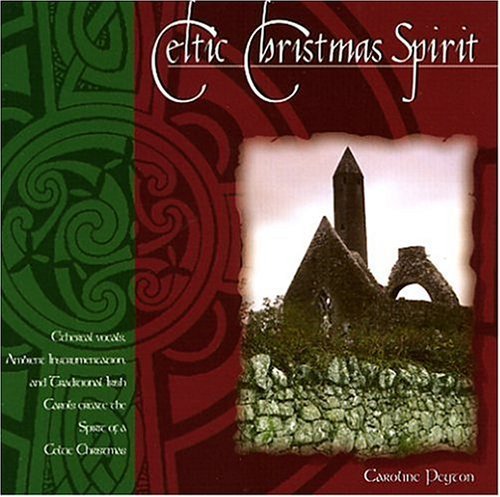
Celtic Christmas Spirit by Caroline Peyton
While this isn't strictly 'Advent' music, I find the haunting quality and some of the more ancient carols in this collection help me stand aside from commercial, contemporary Christmas and engage with Advent. I haven't found anything quite like this collection of Celtic Christmas music. Granted, my taste for the lilting and haunting runs strong, but there is a wonder and glory in this that I savour.
Behold the Lamb of God, by Andrew Peterson
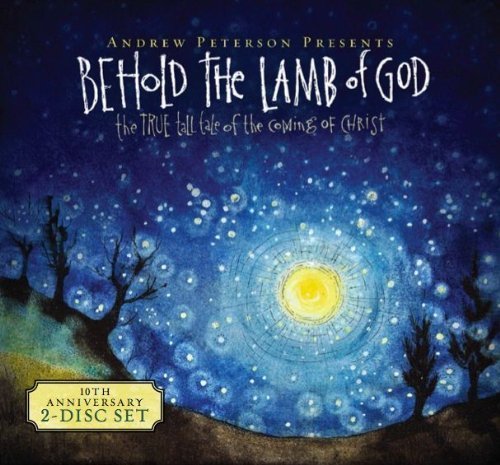
Ah, this is an excellent journey of music, one that draws you into the high drama of angels and the sweet, low folksy drama of the stable in songs you will find yourself singing under your breath throughout the season. Andrew Peterson's storytelling in song, his grasp of the storied nature of faith, has made his music among my favourite for many years, but this album, inviting you to 'behold the Lamb of God' is one that has enriched my Advent journey in countless ways.
The Promise: A Celebration of Christ's Birth, by Michael Card
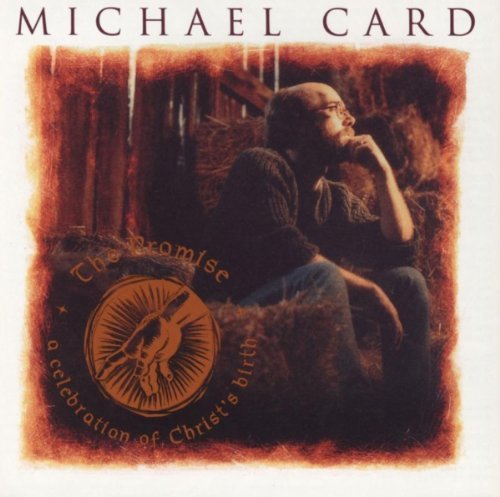
I grew up on these sweet, sweeping, and to me, rather haunting contemplations on the coming of the Christ child. Michael Card's music has companioned me lifelong, and I love it for its scriptural depth, its engagement with the whole of the Bible's narrative, combined with its richly imaginative lyrics. From the prophetic and dramatic tones of the opening song The Promise, this album progresses through the Christmas story through the eyes of the different people caught up in its glory. Whether in Mary's lullaby-like tune and aching wonder, or Joseph's awed contemplation (how can it be?), I find this album touches my heart with a quieted sense of worship.
Midwinter Night's Dream by Loreena McKennit.
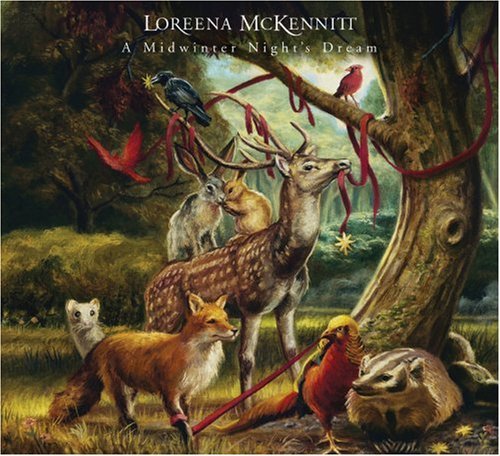
Loreena's music has been beloved of my heart since I was a small child and heard her haunting setting to tune of a Yeats poem. The lilting quality of her voice, her love for the Celtic, her re-rendering of the old folk tunes I always wished I could discover make her a musical companion for all seasons. But I especially savor this collection and play it often in the Advent season, a gathering of more traditional hymns, carols, and yuletide songs whose lyric and melody evoke a feeling of wonder for me.
Handel's Messiah, by, well Handel.
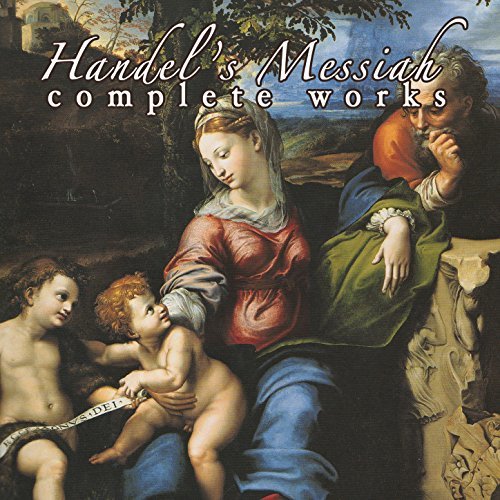
I have listened to this masterpiece on repeat for the past few weeks (I need it!), but this marvelous creation is always an accompaniment to my Advent season. This is a world of a work, an epic of storied music recounting the whole history of Christ's coming, leading us prophecy by prophecy by promise, in some of the most glorious choral music the world has known, into the hallelujah heart of what Christmas truly means. Listen to this repeatedly, let the story of Scripture soak into your memory and heart and tell me if your mind isn't formed a little more to wonder each day.
Update: What I’ll Be Using with My Children
Finally, after much consultation, exploration, and many requests for ideas (if you want more for yourself, go to my Instagram post HERE to read all the wonderful input I received!) I’ve decided to begin our family Advent celebrations with the following resources (several of which I’ll wait to purchase in following years):
I’ll have a daily Advent devotion using Ann Voskamp’s Unwrapping the Gift.
I’ll display the art and adapt the devotions from God with Us: Advent Devotions and Art Prints at A Humble Place.
I’m creating 24 little bags, one to open each day, each with a card (and some containing chocolates) with a phrase of Advent themed Scripture or poetry on one side, and a family activity to do on the other (i.e., make Christmas cookies, hot chocolate and a film, read-aloud, etc.).
Eventually, I’ll purchase these delightful daily Advent Prayer Cards for use at dinner time, with a daily verse, illustration, and collect, published by the ever-beloved old Rabbit Room.
I really love this unique, candlelit wreath as a visual way (and wondrously candlelit way) to celebrate Advent - this will be a future purchase.
The Advent Book looks like a rich possible resource for the future.
And I’m using an idea that many suggested, of wrapping Christmas and Advent-themed books so that the kids can unwrap one every day. Makes reading time even more delightful.
February 17, 2021
On My Ash(less) Wednesday: A Poem
On My Ash(less) Wednesday
I always yearned for piety
For outward acts and signs
To take my hands
Make of my faith a kind of holy pattern,
Woven dance of word and form
Enfleshing faith,
Performing love.
I wanted taste and touch
To speak, express,
To manifest; my hunger
For the grip of God, like flesh
Upon my days.
My first Ash Wednesday
Ah, I revelled in the grey weight of its hours,
The oily smear of ash across my head,
The crusty black, allowing me the chance
To really taste my sin,
My need for grace.
And yet that symbol on my face
Was in a way a mark of aspiration,
Not of self-forgotten
But of self keyed up to reach
For heaven.
Repentance was my means
Of reaching farther
Than the fetters of the normal
Ordinarily allowed.
‘Remember you are dust’ the priest intoned;
His words, I felt, flung like a dare,
That I, with hunger, made my own.
This year, I almost cannot dare
To raise my ashless face in prayer.
The solemn Wednesday hours marched past,
And though I yearned, at instants,
For solemnity, for rest,
I mostly skimmed the minutes, breathless,
Scampering to meet
The burgeoning dictates of
My babes and friends, the small demands
Of fragile bodies, troubled hearts,
Of daily work created by
A grumpy, broken world
That vents its spite in minute-sized disasters
On my ordinary hours,
Conspires to keep me far from quiet,
Or the slanted, gracious light
Of Lenten church.
No ashes touched my face today.
No deep repentance touched my mind.
Within the evening shadows where I sit,
There is no cross upon my head,
Except the taut, dark lines of weariness.
‘Remember, you are dust’ the old words
Echo through my thought.
How well I know it,
Sitting here I scrape the barrels
Of my inmost heart to find
Some piety or prayer to give In expiation of my day
But dust is all I find;
It’s all I have to offer.
Dust from all my doing,
Dregs left after giving,
Dusty hands all caked with normal life.
I gather it and raise my hands.
An offering. Apology.
The house is still, the shadows
Grow. The night expands around me.
Then, a still, small voice;
‘Remember, you are dust’.
The darkness draws back, startled,
So am I, I lift my face
My weary, ashless face,
To meet those words;
I find them this time, not as dare,
But as the sweet notes of a pardon.
I sit in their forgiveness
In the grace of being named
And in my frailty, known.
Silence deepens. So does peace.
And then, a presence
In the newly lighted chapel of my heart.
A hand extends within the quiet.
There, I see it, marked and scarred,
The same that formed us all
From dust, that made a masterpiece
Of mud; for whom our human dust
Has always been the very
Stuff created to be filled by grace
And formed afresh by love.
He reaches out a priestly hand
I wait, in awe, and hear the words again.
‘Remember, you are dust’,
This time, my Lover’s invitation.
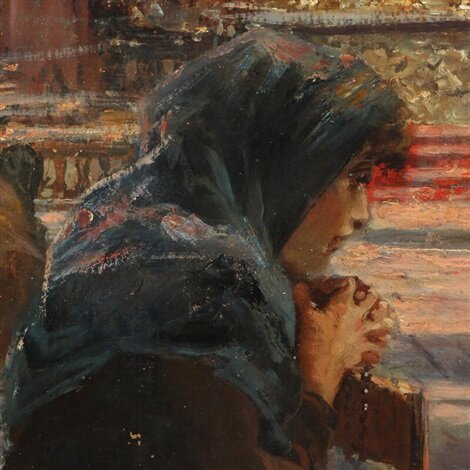
Attributed to Holger Hvitfeldt Jerichau (Danish, 1861–1900)
December 4, 2020
Advent Companions: The Books and Music I Love in the Season of Waiting
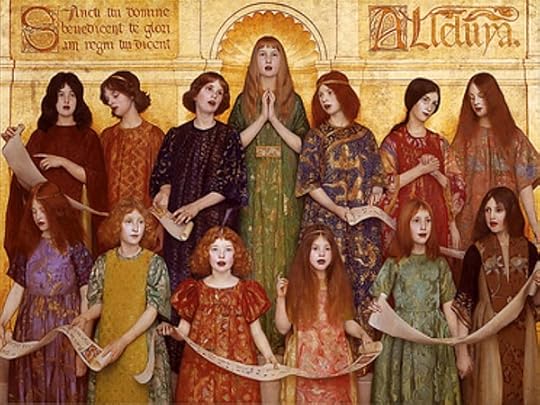
Alleluia, by Thomas Cooper Gotch
Friends, I’m reposting this from a couple of years ago. It’s my annual list of wonderful Advent resources, and it really doesn’t change. I only add something here and there but these are the classics, and these are the resources from which I mainly draw my Advent poetry readings. I’ve included the original essay as well, as it puts me in mind of a time when I actually could go to a gorgeous service at a beloved church, and that does my soul good, and maybe it will yours as well. Happy reading and a gentle, joyous Advent to you all.
I almost didn’t go. The days die into rainy darkness about 4pm around here and I felt cold just thinking about walking out the door. My brain was listless and weary after three sleepless nights with my beloved baby and an essay on philosophy that I gritted out at 3am. My spirit was worn, and a little ill at ease after days without a single formal devotional or contemplative moment. I felt I barely knew what I needed or desired though if you pushed me to the wall I’m pretty sure I would have said I really didn’t have it in me to feel spiritual or contemplative or remotely prayerful. Yet that’s exactly what I set off to do as Thomas kindly (gently) shoved me out the door to take a little break while he put the baby to bed. And I found myself trudging down the wet, cobble-streeted dark, with a breathless mind and a weary body, to the Advent carol service at a church we love.
I felt on the way that it was a waste of time; I could barely focus let alone summon any worshipful attention. I was five minutes late. Someone handed me a candle as I slipped into the shadowy chapel, all long, dim aisles and vaulted, whispery ceilings. I pulled my coat around me and tried to quiet my thoughts. The servers shuffled in, the choir rose, and in a blossoming of golden harmony began to sing the O Antiphons: O come o come Emmanuel… With each verse, each repeated, keening call for Emmanuel to visit his grieved and weary people, I, to my surprise, lost a little of my listless, guilty sense of needing to stand apart. I began to breathe more slowly. I began to watch the flames, to focus on the cross. I began to listen to cries of ancient longing that sounded strangely like my own. Second by second, note by note, word by word, I got woven back into the sphere of worship. And when the choir began to sing their anthem, ‘This is the Truth Sent From Above’, I was listening. And when they came to that verse -
Thus we were heirs to endless woes,
Till God the Lord did interpose
For so a promise soon did run
That He’d redeem us with a Son
Oh. In an instant my heart stirred into yearning. We, oh Lord, me, here in the shadowlands bearing the endless woes and toil of our good, hard, fallen, grieved days. Me, striving to be a gentle and good mother, working to learn and write, yearning to pray and forgetting to do it and losing my patience in the meantime… we here with all those small woes (and great ones too), we are the ones to whom this truth from above is sent: that He’d redeem us with a Son. I felt the yearning to be more than I am, to love more deeply, to know more fully, to return to worship rise up in me as my great sorrow and my real, returning health.
And this, I think, is a small image of what Advent does for all of us. From the clamour and work and grief and distraction of life in a fallen, modern, belligerent world, we are drawn aside into the chapel of Advent devotion. We are invited into a space where we can step away from the pained, frantic life that has become untethered from Love and come face to face with quiet. We’re invited into a moment of hush where we can learn to hear the music of God’s presence again. We often don’t know we even need it until we sojourn there a bit and find ourselves unravelled, and so achingly happy to be so.
Oh friends, the world is so loud and our hearts so harried and our minds so crammed. Step aside with me for a little, into the shadowed space of worship, of waiting, where the flames of love are lit like stars in the darkness and the voice of the Spirit himself sings our hearts back to wholeness. To that end, I offer you my best beloved books and music, companions for the Advent journey and the waiting season.
I’ve used many of these for years, and if you’ve followed me for awhile, you’re sure to recognise the old favourites! But I’ve added quite a few this year, and I think you will love these new discoveries as well. May your soul be hushed and your imagination enriched by these good gifts. Advent begins. Oh, I’m grateful…
My Advent Companions
I first found this years back when one of its most arresting passages was quoted in a daily Advent devotional I received by email. Having found these words - But round about the horizon the eternal realities stand silent in their age-old longing. There shines on them already the first mild light of the radiant fulfillment to come. From afar sound the first notes as of pipes and voices - I hungered for more of the same. And my hunt led me back to this collection of stirring Advent contemplations, one a day through Epiphany. For a book that sets you in the strong, clear light of Advent as a season of preparation, even of penitence, this is the best. The readings here aren't meant to evoke nostalgia or even comfort (yet), but to help a reader come wide awake, to take account, to consider what it is she hopes and what the coming of that hope means to the here and now. For 'preparing a way for the Lord' in my heart in this season, this book has long been a brave and resourceful companion.
God with Us, edited by Greg Pennoyer and Gregory Wolfe

This book is a luminous companion, prepared by the faithful and creative minds behind the literary Image Journal. This book offers carefully selected pieces of art, daily Scripture readings and prayers, and daily Advent devotionals, each week written by a different Christian writer or pastor. This is an ideal Advent devotional book as it offers a compact but rich contemplation, short enough for a snatched quiet time, but rich enough in image and idea to shape one's thoughts for the whole day. It's a world of a book, a twilit, contemplative, Advent world.
The Art of Advent: A Painting a Day from Advent Through Epiphany by Jane Williams

This book is just out, and I ordered a copy the minute I found it. It’s little, which means it fit in my bag for an overnight weekend with ease, but it contains a collection of art to startle and hush, to demand attention and aid contemplation, with reflections by Jane Williams, an author and podcaster known here in England. I am so excited to savor this book and have already loved the first reading, themed on light and darkness, centred on Blake’s startling image of the Ancient of Days.
Waiting on the Word, by Malcolm Guite

Poetry, as Owen Barfield insightfully claimed, can bring about 'a felt change of consciousness', a process that I think is at the heart of Advent celebrations and one that is masterfully crafted for a reader in this collection of Advent poems by Malcolm Guite. Guite's Lent collection has been my companion for the past two years, and the Advent one is a new favourite. Guite doesn't just give you a poem to read, he guides you into the heart of the woven words, words that can truly shift your sight from boredom to wonder, from discontent to thanks, from discouragement to a newly-kindled hope. Combined with his own radiant sonnets, this book is a gift of lyrical beauty and devotional quiet.
Haphazard by Starlight by Janet Morley

This is a similar collection to Guite's, one I have just discovered. It comes highly recommended by my tutor here at Oxford, and we are using some of the poems listed within for an Advent poetry discussion group. I love the way this book introduces me to poems I would never have discovered on my own. And, I mean, the title. Splendid thing.
Advent with Evelyn Underhill, compiled and edited by Christopher Webber

I make no secret of my love for Evelyn Underhill. Her confident, motherly voice in writing, not to mention her excellent scholarship on contemplative prayer and Christian mysticism, has shaped my devotional life in countless ways. This collection of daily Advent readings has been culled from her many devotional works. These are short, accessible, luminous and for me, powerfully formative readings you could peruse in a spare 5-minutes. I've taken this book along to the airport to read in the waiting area and the pithy, wondrous tone always startles my soul awake even in the midst airport craze.
The Glorious Impossible text by Madeleine L’Engle, OR The Nativity , text by Geraldine Eischner, art (in both) by Giotto

Every Christmas of my childhood, Giotto’s art arrested my eye in this book, brought out only for the Christmas season. The gentle or awed or anguished faces, the faded gold, the strange figures embodying a story I knew well, making it new and strange, and yet closer again… I have encountered few pieces of art that so capture the ache and wonder, the pain and passion of Christ's coming into this world. I think that art arrests the mind in a different way than words, allowing our eyes a fixed contemplation in which our imaginations 'see' the story of Christ afresh. In the book I grew up with, Madeleine L’Engle’s lovely prose accompanied the pictures and if you can get your hands on a copy, I highly recommend it. The contemporary (and in print) version by Geraldine Eischner is good too.
The Nativity by Julie Vivas

Lilian received this as a christening gift (I think) and I have been absolutely enchanted with it. Just the simple, Bible text recounting the story of the annuncation and of Jesus’ birth, yet with illustrations so magical I find myself smiling as I read. The sweeping, earthy, humorous images in their gangly contours, the lively, joyous faces, the delight of seeing the annunciation depicted as Mary and the angel sitting at a table over coffee, I just love the humanity and humor of this story and the true, pure wonder it conveys at the same time.
I Saw Three Ships by Elizabeth Goudge

I only grow in my love of good short stories. This one, in a simple, tightly woven little tale manages to tug hard at every hopestring in your heart, combine childhood Christmas delight with grown-up yearning, and bring it all to an end that, I must admit, brought tears to my eyes the first time I read it. It's a gem of a story, an emerald gem, bright with all the life of Christmas if you ask me.
A Christmas Book also by Elizabeth Goudge
A collection of Christmas short stories, some excerpted from her longer novels, some written purposefully for the book. I love that I can sit down for half an hour with a cup of tea and finish a whole, small tale that yet makes me feel I’ve sojourned in a good, spiritually nourishing place. The lively and eccentric characters, the humour, the spice of mystery, the presence of the sacramental in the lovely, all the usual goodness of Goudge comes as a gift in these small stories.
Christmas in my Heart by Joe Wheeler

Joe Wheeler is one of the best and oh so dearly beloved anthologists we have in the States and I was deeply privileged to have him for a mentor. I love these Christmas books, collections he has culled from the reading of thousands of old books. My family used to read these aloud in the evenings during Advent season… and we might have had bets on how quickly mom would tear up. Now I’m the one tearing up… they are sweet, funny, good, family-affirming, old-fashioned tales to enrich the season.
The Silent Bells by William MacKellar

A lovely friend sent me this book last year and it has joined my stack of favorite Advent short stories. Set in the Swiss Alps, named for a set of cathedral bells that have never been heard but are prohesied to ring with the coming of a certain gift at the Christmas Eve service, the book is the tale of little girl's generous heart. It's a dear story, one that stirred my heart. I look forward to reading this to Lilian.
Midwinter Carols v. 2 by Joel Clarkson
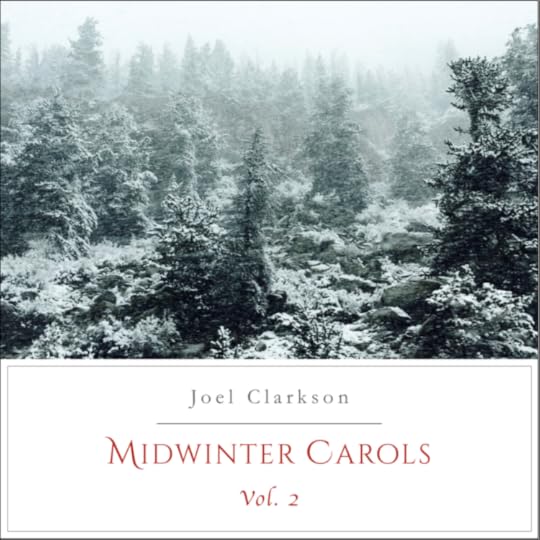
My wondrous brother Joel just released an album of tender, lively, oh so richly woven but oh so quietly rendered carols for Advent and Christmas. I’ve had this album on repeat in the last days with Lilian and it brings such a subtle, rich beauty to our moments.

Celtic Christmas Spirit by Caroline Peyton
While this isn't strictly 'Advent' music, I find the haunting quality and some of the more ancient carols in this collection help me stand aside from commercial, contemporary Christmas and engage with Advent. I haven't found anything quite like this collection of Celtic Christmas music. Granted, my taste for the lilting and haunting runs strong, but there is a wonder and glory in this that I savour.
Behold the Lamb of God, by Andrew Peterson

Ah, this is an excellent journey of music, one that draws you into the high drama of angels and the sweet, low folksy drama of the stable in songs you will find yourself singing under your breath throughout the season. Andrew Peterson's storytelling in song, his grasp of the storied nature of faith, has made his music among my favourite for many years, but this album, inviting you to 'behold the Lamb of God' is one that has enriched my Advent journey in countless ways.
The Promise: A Celebration of Christ's Birth, by Michael Card

I grew up on these sweet, sweeping, and to me, rather haunting contemplations on the coming of the Christ child. Michael Card's music has companioned me lifelong, and I love it for its scriptural depth, its engagement with the whole of the Bible's narrative, combined with its richly imaginative lyrics. From the prophetic and dramatic tones of the opening song The Promise, this album progresses through the Christmas story through the eyes of the different people caught up in its glory. Whether in Mary's lullaby-like tune and aching wonder, or Joseph's awed contemplation (how can it be?), I find this album touches my heart with a quieted sense of worship.
Midwinter Night's Dream by Loreena McKennit.

Loreena's music has been beloved of my heart since I was a small child and heard her haunting setting to tune of a Yeats poem. The lilting quality of her voice, her love for the Celtic, her re-rendering of the old folk tunes I always wished I could discover make her a musical companion for all seasons. But I especially savor this collection and play it often in the Advent season, a gathering of more traditional hymns, carols, and yuletide songs whose lyric and melody evoke a feeling of wonder for me.
Handel's Messiah, by, well Handel.

I have listened to this masterpiece on repeat for the past few weeks (I need it!), but this marvelous creation is always an accompaniment to my Advent season. This is a world of a work, an epic of storied music recounting the whole history of Christ's coming, leading us prophecy by prophecy by promise, in some of the most glorious choral music the world has known, into the hallelujah heart of what Christmas truly means. Listen to this repeatedly, let the story of Scripture soak into your memory and heart and tell me if your mind isn't formed a little more to wonder each day.
Also, there are several books of projects I’ve just discovered this year that I am downright determined to explore and very excited to experience. I haven’t read them yet, but I’m pretty sure they’ll deserve a place on the list of my Advent beloveds:
One Night: An Illustrated Advent Calendar by Adam Farbiarz
I stumbled upon this as a kickstarter project and it absolutely enchants me. An illustrated Advent calendar with each door opening to a different narration of the nativity story.
Come Lord Jesus: The Weight of Waiting by Kris Camealy
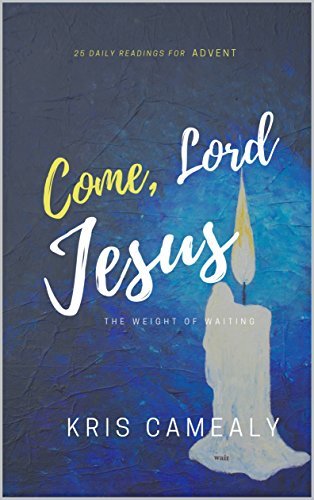
Scripture, reflection, prayers, questions carefully composed, powerfully applied. I love the sample I’ve read; Kris speaks with clarity and gentle grace to the burdens and desires of our faulty and yearning hearts.
Wounded in Spirit: Advent Art and Meditations by David Bannon

UPDATE: I’ve come to love this book this year. It’s very quiet, there is nothing triumphal about it and at moments, it can be bleak as it allows you to sit with the grief you may find in this season. But it is richly beautiful and it thrums with a real and quiet hope, which is often what we most need in times of discouragement. With my fascination by the way art and story accompany us in our suffering, I just cannot wait to get a copy of this book, a collection of art and contemplation crafted as a companion for those who grieve or suffer. One of these days, I’ve got to figure out the whole request a review copy thing…
The Advent of the Lamb of God by Russ Ramsey
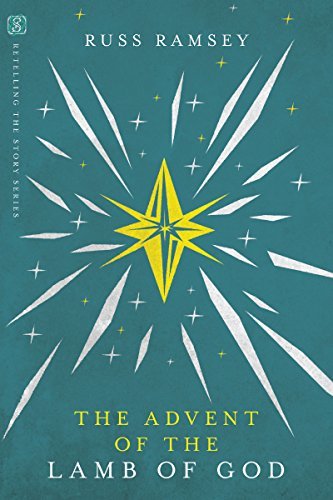
A vivid and creative retelling of the story of Christ’s coming, woven by a pastor with a heart to make the real, true advent of Jesus a story we can encounter as our own reality.
And friends, there you have it for now. Oh my goodness. Let the Advent journey begin and may it, oh may it please, be blessed. Here’s a spare poem to excavate your heart as Advent begins tomorrow:
Advent Calendarby Rowan Williams
He will come like last leaf's fall.
One night when the November wind
has flayed the trees to the bone, and earth
wakes choking on the mould,
the soft shroud's folding.
He will come like frost.
One morning when the shrinking earth
opens on mist, to find itself
arrested in the net
of alien, sword-set beauty.
He will come like dark.
One evening when the bursting red
December sun draws up the sheet
and penny-masks its eye to yield
the star-snowed fields of sky.
He will come, will come,
will come like crying in the night,
like blood, like breaking,
as the earth writhes to toss him free.
He will come like child.
April 9, 2020
Holy Week By Art and Image, Story and Song
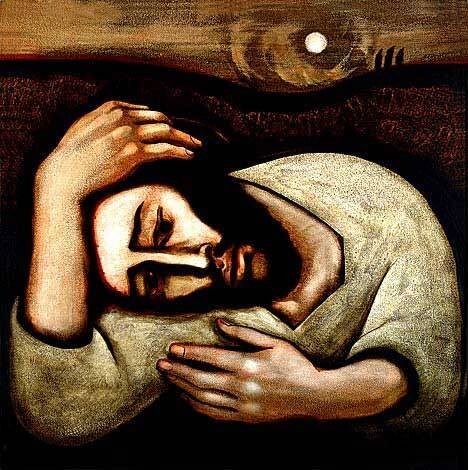
Christ in Gethsemane by Michael O’Brien
‘Jesus said, wait with me. And maybe the stars did,
maybe the wind wound itself into a silver tree, and didn’t move.
Maybe the lake far away, where once he walked
as on a blue pavement,
lay still and waited, wild awake.'..’
- from Gethsemane by Mary Oliver
Oh, to be ‘wild awake’ with Christ this Holy Week like Mary Oliver’s blue lake. Maundy Thursday has come with the invitation to watch with Christ through these three days of his passion retold and lived. I always find this space of Holy Week both beautiful and challenging. I always start with a keen heart and quickened mind, ready to pray longer, watch more solemnly, discipline myself to a few days of real gravity and prayer. But I always struggle to keep my resolve; I sympathise more each year with the disciples who fell asleep. I think their exhaustion is just a small picture of human frailty in the ordinary, of daily weariness. In it I glimpse the way that even eternal dramas can play around us while we’re just…tired. And it’s a particularly weary watch this year away from church with the pandemic raging and these endless, unbounded days of strangely intense home life.
So I’m turning to works of music and story, art and film and imagination as companions to help keep my attention awake, my heart engaged and alert. Join me?
You see, one of the things I most love about worshipping in the Anglican tradition and will most deeply miss this year is the chance to join the drama of the Triduum, these three days when we, in a sense, dramatically enact the story of Christ’s death, burial, and resurrection. I didn’t grow up in a liturgical tradition, and when I first experienced a Maundy Thursday service with the stripping of the altars and the thick, dark silence that followed, and the sheltering in the candlelit presence of Christ at the end, I felt startled and alive, drawn into the fullness of Jesus’ passion in a way I never had before, able to actually join the drama through the words and imagery of the liturgy. My imagination and heart thrilled to life.
Remembering this, the way the liturgy and drama allowed me to feel myself ‘inside’ the story with Christ, and mulling how I could engage in a similar way this year, even without church, I’ve been reminded that the arts engage my whole self in a similar way. A turning point in my faith journey was discovering C.S. Lewis’ essay ‘Meditation in a Toolshed’, with his illustration of the way that works of imagination and beauty allow us a different way of ‘knowing’ truth by letting us stand inside an experience. This is true of art and image as well as ‘poetic works’ of story, poem, and myth. A writer named Owen Barfield described the way that reading poetry or literature allows us ‘a felt change of consciousness’. We see the world and ourselves differently. This is what happens in liturgy, but it’s also what happens when we engage our imaginations in the arts. We are able to enter into the drama of God’s love in a unique and dramatically powerful way.
So I invite you to join me in engaging with the passion and drama, the divine love and beauty of Holy Week through works of artistry, beauty, and imagination. I’ve compiled a list of the works I’ll be revisiting in order to help me keep watch with Christ, keep my heart attuned both to sorrow and hope, and ultimately to stand in that watchfulness that culminates in the crashing, opened tomb of Resurrection morning…
(Note: some of the works I list below are not directly related to Easter or Holy Week, but each engages in what I think is the theme of the different days in a way I find beautiful.)
Maundy ThursdayFilm: Babette’s Feast
This lovely film echoes with the kind of humility and grace embodied by Jesus when he washed the disciples feet. A stranger comes among a small, devout village in Denmark, full of people who think they know what God’s grace means. They take the woman in on charity, never realising who she is until she offers to throw them a feast…
Music: Bread & Wine by Josh Garrells
My heart is always a little broken, in a good way, by this song. I often sing it to myself as a confession. I remember Peter’s blustery rejection of Jesus’ servant touch when I hear this, and it helps me to accept that touch for myself.
Book: This passage from Island of the World by Michael O’Brien (this is a stunning novel of suffering and love, and well worth reading in full; you can read my review HERE):
“Love is the soul of the world, though its body bleeds, and we must learn to bleed with it. Love is also the seed and milk and the fruit of the world, though we can partake of it in greed or reverence. We are born, we eat, and learn, and die. We leave a tracery of messages in the lives of others, a little shifting of the soil, a stone moved from here to there, a word uttered, a song, a poem left behind. I was here, each of these declare. I was here.”
Poem: The Agonie by George Herbert
Art: Christ in Gethsemane by Michael O’Brien and Jesus Washing Peter’s Feet by Ford Maddox Brown:
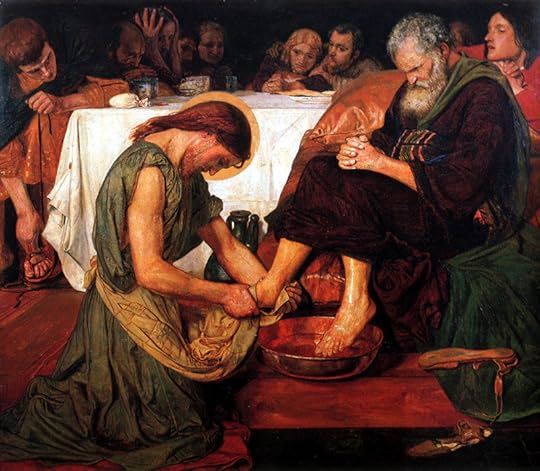
Good Friday
Film: Of Gods and Men
I am always struck still and quiet by this film, one based on the true story of a monastery in Algeria in the 1990s, whose monks were forced to decide whether to stay among the people they served and loved, or flee in the face of regional violence. It’s a Passion themed story, exploring what it means to lay down one’s life in love.
Music: St. Mathew’s Passion
Book: This passage from The Dream of the Rood, a devout poem in Old English:
It seemed to me that I saw the greatest tree
brought into the sky, bewound in light,
the brightest of beams. That beacon was entirely
garnished with gold. Gemstones
prominent and proud at the corners of the earth—
five more as well blazoned across the span of its shoulders.
Every angel of the Lord warded it there,
a brilliant sight of a universe to come.
Surely it was no longer the gallows of vile crime
in that place—yet there they kept close watch,
holy spirits for all humanity across the earth,
and every part of this widely famous creation.
(The whole thing is worth reading aloud on Good Friday…)
Poem: Salvator Mundi: Via Crucis by Denise Levertov
Art: Christ Carrying the Cross by Jan Sanders Hemessen:

Holy Saturday
Film: The Tree of Life
This is a film you must encounter almost as a visual symphony rather than a linear narrative. An impressionist film exploring what grace means in a broken world, what it means to love, what redemption might be for those who do.
Music: Ubi Caritas by my own brilliant brother HERE and by Ola Gjeilo HERE
Book: This passage from The Return of the King by J.R.R. Tolkien:
Suddenly Faramir stirred, and he opened his eyes, and he looked on Aragorn who bent over him; and a light of knowledge and love was kindled in his eyes, and he spoke softly. 'My lord, you called me. I come. What does the king command?’
'Walk no more in the shadows, but awake!’ said Aragorn. 'You are weary. Rest a while, and take food, and be ready when I return.’
'I will, lord,’ said Faramir. 'For who would lie idle when the king has returned?’
Poem: Ikon: The Harrowing of Hell by Denise Levertov
Art: Peter and John Running to the Tomb by Eugene Bernand:

March 12, 2020
Psalms or Headlines?
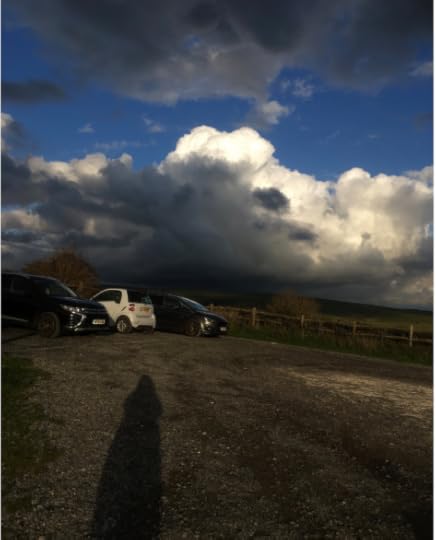
Feels like a storm is gathering these days, doesn’t it?
I woke with a taut, anxious mind. I was up in the middle of the night and saw the ratcheting red headlines about the coronavirus. They played in my head as I tried to sleep again, wondering who among those I love might be vulnerable and how it all might affect our families, our church filled with elderly people, our freedom to travel to those we love.
In the blue dawn light, chill and silent, I felt summoned to pray. I was aware of fear blossoming in my mind, growing also in the outer world like a swift, gathering cloud. I felt the brooding threat of it shadowing my eyes. But… pray. Pray. So I did. And like beams of light razoring through storm, my mind was gently pierced by line after line from the Psalms I have known and read throughout my adult life:
Trust in the Lord and do good.
The poor looked to him and were radiant.
The Lord my God is my strength and my song.
When I am afraid I will trust in you.
Abruptly, I was aware of the way that those songs of trust and desire, yearning and desperation sung by the faithful through countless generations, were telling me a story larger and realer than that of the headlines.
‘The Lord is near to the brokenhearted’
’The Lord is the one who holds your hand.’
’The Lord is a refuge to those who love him.’
All the old truths gathered at the door of my thought. Things that are true, not as headlines are briefly, gaudily true, but as mountains are true; ancient, rooted, the granite stuff of which the very world is made. And I knew a deep urgency, a conviction that as the days become dark and difficult, I must cling to the older and ancient truths of Scripture, trusting that they tell a story larger than that told by the headlines. I decided I wanted to write about it here, to cultivate confidence in the unchanging goodness of God.
Then I went downstairs and discovered that my house had been broken into overnight.
And for a few hours, I forgot the Psalms. Every downstairs drawer in our home was open, a cigarette on the floor, my husband’s backpack gone. Nothing too valuable stolen, no real harm done, but oh, the seize of my breath, the tightness of my heart at thought of a stranger roaming my home, my safe place, in the darkness, so close to my little ones. My mind became it’s own little newsroom filled with headlines and ‘what ifs?’ in panicked red. ‘This is your nightmare, isn’t it?’ said my husband, knowing the way my particular brand of OCD works. And it is. Even though I know with profound gratitude that we are safe and unharmed, to have a stranger break into the house is one of my obsessive anxieties.
And the headlines of my fear flashed again and again across my brain. I sat down as we waited for the police to call, trying to get my breath and felt that the rumour of disaster was outside me, roaming the world, and within me, disturbing the peace of my inmost heart. I sat in the blue chair by my window and tried to pray…
Be still and know that I am God.
The Lord is my strength and my song.
The Lord is our refuge and strength, a very present help in trouble.
The old, holy words broke again, like sharp, razored light through the shadow of fear, the rumour of trouble. Brief lines but pithy and potent with truth. I was struck by the way the lines from those Psalms felt like headlines. Those phrases were struck into being by raw and mighty emotion. They were made on the way - to battle, to hiding, to praise, to need - and so are in their way words of the eternal human now, in all its desperation and desire and fear. They echo with all the immediacy and anguish of the headlines that flash across my screen. But they operate very differently upon me.
Psalms or headlines. They are two kinds of language. One is the language of the instant, immediate panic, words that provoke uncontained, raw emotion by the sheer blast of disastrous information in news headings and the dispatches of our own fear. Headlines aren’t tethered to history or framed by story or nuanced by a larger truth. They are, in a way, a language of chaos, provoking but never solving the emotion they instigate.
But Psalms, they are a language of trust. For though they too express and proclaim our most desperate emotion, they frame and interpret it within the structures of faith, hope, and love. The Psalms hum with the highest and lowest the human heart can feel. They give us permission to rail and weep, to yearn and grieve. But that raw feeling is woven into music because it sits within the forms made by the larger story of God’s creativity, his faithfulness, his love. The Psalms witness to our origin - made for joy, formed by love - and our end - all that is lost reclaimed, all that was broken restored. Psalms are a music made by story; it is narrative that frames and shapes the anguished words of human need into music, one sung throughout the ages by those who tried God and found him true.
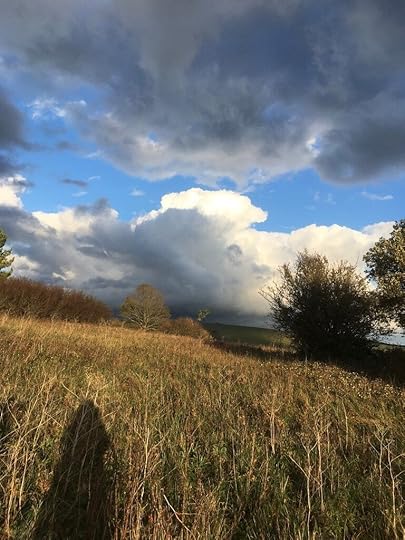
Trust in the Lord.
He is our refuge.
He heals the brokenhearted.
God is a stronghold to those who trust in him.
The Lord is our helper.
I began to sing those Psalms, slowly in my own heart, throughout the day. I allowed them to meet and wrestle with the headlines both of the news and my own too vivid imagination as I considered the coming night and all the fears I’d have to face. I whispered them as prayers when adrenaline left my hands shaking. I sang them within myself as a way of keeping my courage up and my hands strong to comfort the baby and call a friend and keep it together around Lilian. And as I sang, gradually, in occasional bright glimpses, I remembered where I stood in the larger story of the world: beloved of God, redeemed, called to live by faith in a love that is transforming and defeating all evil. Even pandemic viruses. Even OCD (and the upsets that set it raging).
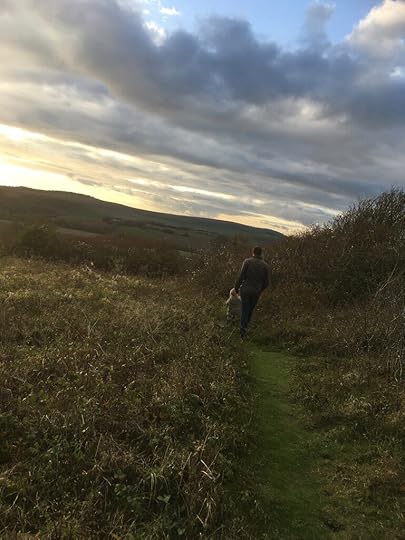
It’s hard work, though, to sing. Hard to turn my eyes from the gaudiness of constantly updated alarm to the old, quiet songs of faith. And so, I’m returning at the end of this day to the impulse that was like a fire in me in the early morning. In these times of worry and fear, we need to sing the Psalms often, aloud, and in fellowship. We need to walk through our days with minds formed by hope, not by the latest headline. We need to remember with will and courage, the words of Scripture and poem, story and song that will keep us steadfast in our belief in God’s goodness, presence, and grace. We need to repeat the story day after day, remember the signs like Jill in Narnia.
And we need to do it together. One of the dreadful things about this illness is the way it drives us toward isolation. So I want to make my little online rooms a place where we can come together to say the Psalms, the ancient ones of Scripture, the new ones of poetry. The storm may be gathering, but friends, I believe we have the capacity to choose which language we will live by; that of chaos, or that of trust. Headlines or Psalms, I think we can choose.
So here’s my commitment to you. As often as I can (and far more often than I have been!), I will read aloud each day a passage from the Psalms and a poem of hope or trust or courage. You can see those videos on Instagram or Facebook. I’ve been doing the poetry here and there anyway, but I think we need the words of the Psalms as well, and I think we need to sing and say them together. Also. I have another idea brewing, a way to help us all draw together round the pursuit of beauty even in the darkness. Keep an eye out here because I’m going to talk about it soon. For now, here’s the first Psalm and poem (recorded hastily as the babies began to squall in the background…):
February 27, 2020
On My Ash(less) Wednesday: A Poem
On My Ash(less) Wednesday
I always yearned for piety
For outward acts and signs
To take my hands
Make of my faith a kind of holy pattern,
Woven dance of word and form
Enfleshing faith,
Performing love.
I wanted taste and touch
To speak, express,
To manifest; my hunger
For the grip of God, like flesh
Upon my days.
My first Ash Wednesday
Ah, I revelled in the grey weight of its hours,
The oily smear of ash across my head,
The crusty black, allowing me the chance
To really taste my sin,
My need for grace.
And yet that symbol on my face
Was in a way a mark of aspiration,
Not of self-forgotten
But of self keyed up to reach
For heaven.
Repentance was my means
Of reaching farther
Than the fetters of the normal
Ordinarily allowed.
‘Remember you are dust’ the priest intoned;
His words, I felt, flung like a dare,
That I, with hunger, made my own.
This year, I almost cannot dare
To raise my ashless face in prayer.
The solemn Wednesday hours marched past,
And though I yearned, at instants,
For solemnity, for rest,
I mostly skimmed the minutes, breathless,
Scampering to meet
The burgeoning dictates of
My babes and friends, the small demands
Of fragile bodies, troubled hearts,
Of daily work created by
A grumpy, broken world
That vents its spite in minute-sized disasters
On my ordinary hours,
Conspires to keep me far from quiet,
Or the slanted, gracious light
Of Lenten church.
No ashes touched my face today.
No deep repentance touched my mind.
Within the evening shadows where I sit,
There is no cross upon my head,
Except the taut, dark lines of weariness.
‘Remember, you are dust’ the old words
Echo through my thought.
How well I know it,
Sitting here I scrape the barrels
Of my inmost heart to find
Some piety or prayer to give In expiation of my day
But dust is all I find;
It’s all I have to offer.
Dust from all my doing,
Dregs left after giving,
Dusty hands all caked with normal life.
I gather it and raise my hands.
An offering. Apology.
The house is still, the shadows
Grow. The night expands around me.
Then, a still, small voice;
‘Remember, you are dust’.
The darkness draws back, startled,
So am I, I lift my face
My weary, ashless face,
To meet those words;
I find them this time, not as dare,
But as the sweet notes of a pardon.
I sit in their forgiveness
In the grace of being named
And in my frailty, known.
Silence deepens. So does peace.
And then, a presence
In the newly lighted chapel of my heart.
A hand extends within the quiet.
There, I see it, marked and scarred,
The same that formed us all
From dust, that made a masterpiece
Of mud; for whom our human dust
Has always been the very
Stuff created to be filled by grace
And formed afresh by love.
He reaches out a priestly hand
I wait, in awe, and hear the words again.
‘Remember, you are dust’,
This time, my Lover’s invitation.

Attributed to Holger Hvitfeldt Jerichau (Danish, 1861–1900)
February 19, 2020
Thoughts on Restoring A Weary (and Distracted) Mind
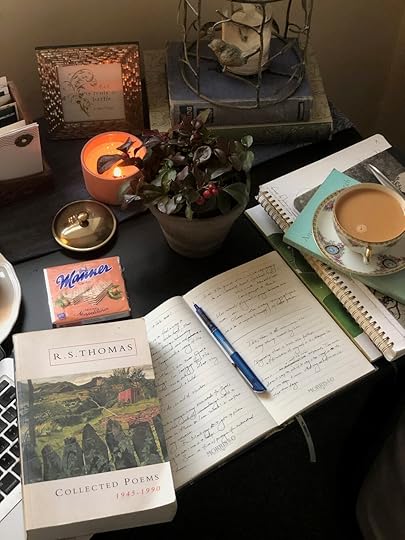
We’ve had another squall of a storm here in England, and the old tree out my window creaks and sways in the sea wind. But the air in my tiny writing room is, for once, still. And I, oh so rarely, sit in the quiet entirely alone. The light slants through the latticed panes, my journal lies open, my heart restless for creativity. But my mind is a beehive of distraction. My eyes feel unable to rest. My thoughts leap here and there, yearning for a set path, yet unable to find one. And I meet, once again, my deep need to find a way to restore and hush my weary, distracted mind.
If there is one thing I find most achingly difficult about motherhood, it is the lack of solitude. The deep quiet of long contemplation is the native air in which my imagination comes to life, in which my soul wakes, sniffs the air, and leaps to joyous activity. With two adored but demanding little ones about, that kind of time simply isn’t available in this season. The time I get is fractured, snatched during naptime or on my husband’s day off, and I often feel my mind is so fractured once I reach it, I barely know what to do with the space I have.
This is, I know, a season of profound self gift as I invest in the souls of my children. This is good. I choose it. I love it.
But my own heart needs still to breathe, and learning the work of a different pattern of soul breath has been my fixation in the last few weeks.
My thoughts have grown more urgent as I’ve come to an increasing awareness that the handy little screens we all carry these days offer an instant and alluring point of focus for a weary mind. In the long nights and small hours, in the bored stretches of afternoon, the turn to my phone is so easy a way to feel a touch of adult connection, a fleeting instant of inspiration or information.
That’s fine, perhaps. There’s a place for it, a goodness in the connection those little screens can offer. And yet.
In my exhaustion, I notice myself turning to the screen in a compulsive way, a comprehensive way, checking and rechecking this and that site or app for something new to excite me, turning to it for comfort in my moments of depression, as company in my loneliness, as the source of answers for every question I have.
I find myself using it as, dare I say it, a replacement for the Holy Spirit. As if it could answer all my questions and comfort my anxiety and keep me company in the dark nights and sate the hungers of my soul. And I become so trained to it’s pattern of leaping from this image to that fragment of text, that my mind becomes even more restless, fragmented, trained to restlessness rather than peace so that even my quiet moments become bereft of stillness. The screen doesn’t really offer me rest. It offers distraction, but not recollection. And my thoughts are only further fragmented, leaving me scattered in attention, and with an inward kind of exhaustion far more draining even than the outward and physical.
So I have begun to fight for the restoration of my weary mind.
But it has to begin in grace. This is no time for legalism (and yes, I do still use my phone!). I need grace and I need to be gentle to a self already overspent in the love of my young ones. As I’ve mulled this all, I remembered what Andy Crouch wrote about the way that change takes place, not by merely saying ‘no’ to a wrong thing, but ‘yes’ to a new, creative, engaging thing.
‘Behold, I will do something new’ says our restorative God. So, by jove, and by way of restoration, will I. I will create new spaces and rhythms for my mind. What, then do I need?
I need the opened window of centred attention.
I need the inrush of cold air quiet even in spurts of a minute.
I need companions of imagination and prayer to take me by the hands and lead me to my centre.
I need tangible ways of reconnection that replace and combat the busyness in my mind and it’s temptation to screens.
I need bite-size gifts of beauty that fit my brief moments alone and I need to keep them in all the places I sit to rest, to nurse, to work.
How, then, may I claim it? I’ve wrestled out several ‘rules’ for myself to follow, a scaffolding on which to build my new patterns:
I must savour silence
I’ve realised that my first need is just to learn once more to sit and be quiet. To let still moments be… still. Somewhere along the way I fell into the habit of thinking that each moment needed to be filled, my mind engaged or my body busy, and the phone (because the internet and its technologies are limit-less) agreed. But ‘be still and know’ says God. I need to remember the way that a quiet instant can be a gift, a summons to attention that allows the whole of body and self to breathe. Now, I’m learning to let the quiet deepen when it comes, to look out the window, to breathe…
I must walk with words.
In this season of brief moments, I’ve found afresh the gift both of liturgy and poetry as a particular kind of language that helps to ‘stab my spirit broad awake’. Words weave worlds, I’ve always said. The words we read and speak quicken our sight, focus our thoughts, frame our vision of the world. And when we are exhausted, drained of deep thought or the words we need to express our longing, the words of others offer us sustaining companionship. I find such rich friendship in praying the liturgies spoken by countless Christians through the ages. When I nurse Samuel to bed at night, I whisper a few words from this version of Compline, or use the morning liturgy from Celtic Daily Prayer to attempt a brief quiet time in the morning. Poetry, so often sized just right to a minute or two of solitude, is potent, swift, a beam of language stabbing into my dusty brain like a beam of sunlight. A few lines of Mary Oliver, or a Herbert sonnet, allow me a freshened vision that alters the whole of the morning.
I must make prayer practical.
Months ago, in the haze of both dissertation writing and early pregnancy, I spoke with a spiritual mentor about both my yearning to create (and my inability to sustain) a life of regular, deep prayer. The speed of deadlines, the demand of my little one, the busyness of the student life, the rigours of pregnancy all conspired to make prayer a difficult thing for me to practice. I thought he might give me a mini lecture on contemplation, on increased discipline. Instead, he gave me a list of activities that felt almost childlike. He told me that I should use every little means available to me to hep me pray. Write out the prayer of a writer I loved. Hold a cross in my hand. Wear a bracelet to remind me of God’s presence. Kneel. Sing. Choose a colour every morning and let each sight of it throughout the day prompt me to a breath prayer. So I’ve copied out prayers by St. Aquinas and Elizabeth Goudge. I wear a prayer bracelet with a tiny cross, given me years ago by an Orthodox friend. I make the sign of the cross as I begin to pray, as a means of engaging the whole of myself, weary body and restless mind, in conversation with the Almighty.
I must shelter in story.
In moments of exhaustion and crisis throughout my life, stories have always kept me in hope. We are, as I have written at length, storyformed people, living beings told into existence by the Word, our own lives dynamic and actual stories in which we play the hero or heroine, the villain or fool. But we lose sight of this reality when we are exhausted or discouraged. We lose the capacity to imagine ourselves as agents, capable of, as Rowan Williams puts it in his book on Dostoevsky’s fiction, a kind of ‘authorship’ in our own lives. In those seasons, stories are medicinal. They heal our shortened sight and open the horizons of imagination while also allowing us a space of mental relaxation. So I’ve been returning to old and beloved authors, seeking out new ones too. I’m re-reading My Antonia! by Willa Cather, listening to new novels as Audiobook. I’ve ordered a novel (Knight’s Fee) by Rosemary Sutcliffe set in the countryside where I now live, plus a new novel by Shawn Smucker that I’ve heard praised in several trustworthy quarters. These books will rest and shelter me, quickening my capacity to imagine, to act, to enjoy the world in my own current chapter.
I must engage in Scripture.
If stories are my shelter, Scripture is the one great story I need to remind me of my origin (called into being as the beloved of God) and my end (sharer in the divine life, co-creator, agent of beauty). Quiet times and prayer. The first things that fall away in seasons of disorientation and exhaustion. The first things I reclaim when I get on my mental feet. But there’s space for creativity even here! I’m now keeping coloured pens with my Bible, helping myself to interact with my daily passages (usually read while nursing Samuel) by marking the words that blaze out to me. Even more fun? I’m letting David Suchet read two chapters of the Bible aloud to me every day… I can’t recommend this highly enough!
This may, perhaps, be one of the more rambly, practical posts I’ve written in many a day. It took two naptimes and one hour of husbandly generosity to finish and thus is rather haphazard in construction. But the healing of our minds, the centering of soul and consciousness, is something I think we must all fight to claim in the modern world. Our limits these days are so few, but our exhaustion so constant, our distraction unceasing. So I offer these ramblings as encouragement to the pilgrims who tread the old road, the precious old road, to quiet. Who yearn to listen, like me, to what grows in the music of real silence. Who struggle uphill to reach for freshened vision and clear sight…
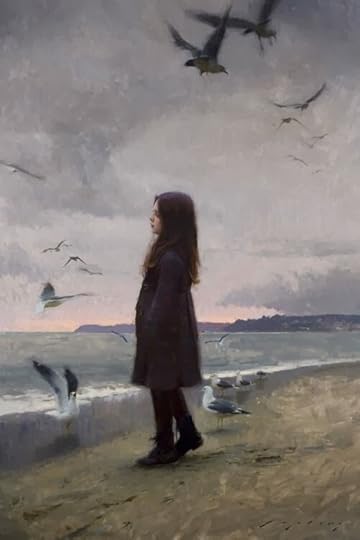
December 20, 2019
On Writing a Book Amidst Advent, Death, and a New Baby
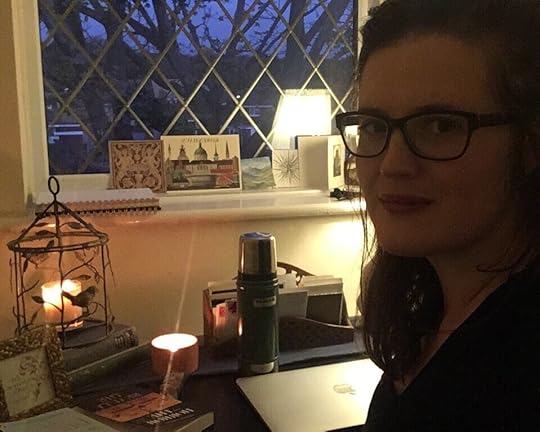
This Advent is a strange one. With a funeral just behind and a birth just ahead, and an 8-months pregnant me slowing radically down by the day, the usual rounds of things I do to signpost Advent have fallen by the wayside. Of course, there are always candles lit and carols softly lilting in the background, and to Lilian’s and my immense and daily enjoyment, we now have a Christmas (‘cough’, I mean Advent) tree glimmering in the corner. But I feel more that I am sinking deeply into the Advent twilight, rather than journeying toward the light. But I’ve begun to think that’s no bad thing, especially as I have returned to the writing of my book.
You think you know what you’re going to write when you start a book.
At least, I did when I began this one. You’ve heard me mention it a dozen times and I’ve had it in my head and heart for years: Beauty Never Lies, my story about how God met me in the midst of mental illness and loneliness and disappointment with moments of beauty that transformed my faith by helping me to discover a good and beautiful God working to heal me right in the midst of my darkness.
I thought I was ready to write this especially because I came to the writing fresh from five years of theological study that had finally, blessedly, helped me to untangle and begin to find healing from the hard, questioning years before it. I discovered the term ‘theodicy’ (a word describing the way we defend God’s goodness in a broken and suffering world) and knew it was the subject I had been circling in the defining questions of my faith, knew that this wrestling with God in the silence of pain had been my work since I was diagnosed with a mental illness at seventeen and watched it reach into and unravel every corner of my identity. Why do we suffer? Where is God in the midst of it? How can we still believe he’s good when the world he’s created has gone so horribly wrong?
I’d asked the questions and come to my conclusions. It wasn’t exactly that I had concrete answers to the ancient and impossible questions of theodicy, but rather that I felt that I had learned, in a deep and radical way, that God answers us not merely with explanations, but with Himself. That he reaches out to us in a suffering world through the hands of the good and the beautiful, through laughter and touch, starlight and music. I felt that I finally understood the countless small moments of wonder, of presence, of a hope that came to me beyond that touch of darkness, helping me to believe in love throughout the dark years of my doubt. And I had the theological chops to finally say what I wanted to about it.
So after we moved to a new part of England, settled into our home, and got life in order, I began to craft the book during our family holiday to Denmark in October (my husband is half Danish) when we stayed in a little cabin on the coast. In the mornings, Thomas would whisk our little daughter down to the nearby shore to play while I wrote as hard as I could. I sat at the cabin table, watching the red sun cast her rays across the bay, catching the tops of the firs. I watched the wild swans dip and sway in the icy water. I wrote feverishly. There was a dramatic edge to what I created as I sought to contrast the darkness I had known with the loveliness that invaded it. I wanted to write something that crashed into my reader’s world like sunrise and music, like a fairy tale with all the satisfactions of a happy ending.
And there was nothing wrong in that desire. But though I didn’t fully realise it, I was writing about the past, writing from the far side of a dark and suffering season, with the light of prayers answered full on my face.
A week later, we returned home and received a phone call. My husband’s precious mother, a woman of warmth and faith like few I have ever met, a woman in her prime years with young grandchildren and decades of memories yet to make, had been told her cancer was terminal. Of course, at first, we were business like about it, thrust into the busyness of back and forth travel between our home in England and the Netherlands, where she lived. We thought there was time, we talked with the family of treatment options and we operated, still, as if normalcy reigned. And then her condition deteriorated. We saw, first hand, the dreadful ravages of disease in the human body, the aggressive cancer, the pain, the way it steals, little by little, speech and ease, movement and consciousness. We watched from afar after we returned to England until the day came when we knew we needed to start driving if we wanted to say goodbye. From the day we found out her cancer would be terminal to the day she died, it was only four weeks.
My husband, an Anglican priest, led and preached at her funeral, and I witnessed the way that a life suffused by faith can transform even death. Susette’s profound love for God and her family, her unshakable trust in his goodness reached out to take our hands as we sojourned together for a week after she passed. But when they lowered her coffin into the grave and I stood amongst her children, held the granddaughter that would never know her, stood under a grey sky next to the son who once had been her baby and watched her body taken irrevocably from us, I wept.
And when we woke the next day, everything finished, the long, long silence of sorrow settled in around us. We faced, not the immediacy and drama of first loss, but the years which must be reckoned anew in her absence, the countless moments in which her loss will sit like a new wound, opened afresh with each of the sweet, family events to which she will never come. We came home to England, and exhaustion, pervasive and deadening, caught up with us and made normal life feel almost undoable. We all caught colds. Our nights were a bit disturbed. We were grateful for each other, we had hope, but we were also walking in that wide, grey country that comes to the inmost parts of the human heart in the midst of sorrow. A quiet, waiting place.
I sit, now, in my home office, trying once more to pick up the threads of this book. The words I wrote a month before ring tinny to my ears. They aren’t untrue, but in the maze and fog of our current loss, I am reminded afresh what it means to walk in darkness, to ask, and hear no defining answer to the aching questions that so mercilessly attend the loss of what we love. Why did she have to die? Why did she have to suffer so deeply, be so destroyed physically? Why must such a luminous life cease from the earth when countless others cast shadow?
I am reminded again why I so vehemently oppose the answering of suffering by systems of theological assertion. There is no adequate explanation given in the cold voice of reason to answer our intimate experience of a loved one whose body disintegrates before us. I am reminded again why I so deeply believe that God does answer us, but in the language of presence, in the givenness of his own frail, human Son, in his hands, clothed in countless tangible moments of beauty. He is here, not crashing in with light that makes our tear-sore eyes ache, or with demands that we believe in a list of assertions, he is here, like a star whose tender light cannot be dimmed by a legion of darkness. He is here, like the swell of new buds after winter. He is here like a lullaby sung in the night to a fretful child. He is here… like the stir and stretch of a child in the womb. My womb.
For as the old questions about God’s love and the reality of pain echo afresh in my mind, my second child, a son, stirs in my belly. A child will be born to us, a child whose coming gave my mother-in-law great joy. The gift of life, that undeniable embodiment of new hope in a new and innocent baby, is coming to us. We are watchful, quiet, as we await him. His birth is less than a month away, and we’ve drawn in close to prepare for him as energy wanes and Christmas draws near. And I am struck today as I write to realise that this final month of waiting for our son, keeping vigil with his grandmother, takes place in the hush and stillness of Advent, that season of twilight, where the light that will finally prevail has been seen by people who yet… ‘dwell in darkness’.
Never in my life have I been so viscerally aware of the tension between the darkness in which we are tangled and caught, and the hope that leads us forward out of it. Advent can be a tantalising and difficult season, difficult to keep with any regularity because we feel either drawn irresistibly forward into celebration, or else, mired in the kind of sadness that freezes our feet and bows our heads. Yet this tension, this strange middle place is where we wait for the kingdom to come, these are the shadowlands where the light is growing, this is the quiet space into which Beauty speaks it’s truth.
But it’s a fragile, and often hidden beauty, and that’s what I’d almost forgotten.
Fragile like a baby in the womb. The little son to come especially makes me marvel; death at my back and birth before me, and in my own body, the rustles and thumps of tiny hands and feet, the dance of a little one whose hope-bringing life puts me daily in mind of the baby born in Bethlehem two millennia before. In bearing this strange beauty, I am aware of the way hope yearns to be born in my heart.
Rarely have I known such exhaustion as I do this year, heart and body worn out with emotion and pregnancy and all the gathered weariness of a broken world. Yet never have I known such a strange brightening of my heart amidst it at the words of old Advent poems, at the echoed, aching beauty of Isaiah passages read in the half light of the mornings, the plucky shimmer of Christmas tree lights, or the sweetness of the two little ones, one inside me, one dancing circles round the Christmas tree outside, whose existence defies the power of death. These intimate, quiet beauties are speaking truth to me in a daily way, drawing me forward into effort and hope, into joy.
Beauty, reaching out to me in countless tiny moments of light or laughter, quiet or human touch, knocks upon the door of my heart and I am made aware that God is here, asking to enter the darkest room of my sadness not as a conqueror but as a child come to heal. He is so tender, and redemption is such an intimate, personal business.
Beauty in the hidden places. Beauty like a seed planted in the soil of our yearning. Beauty like a precious babe, grown great in the womb, reaching toward birth. This is the hidden beauty that has transformed my life again and again, and as I walk once more in the starlight of its grace, I begin to be ready to write that book after all. Today I’m scratching out my story in the half light of Advent, looking toward the light, writing about the beauty that comes, fragile and indomitable, to the hidden places. To real-time loss and ordinary discouragement and ongoing exhaustion. I’m writing about seeds and new babies, luminous moments, and the secret places where God invades and light grows in defiance of shadow.
And I think the babe in my womb might just be leaping for joy as the Christ child comes afresh to my heart…

December 4, 2019
Advent Companions: The Books and Music I Love in the Season of Waiting

Alleluia, by Thomas Cooper Gotch
Friends, I’m reposting this essay from last year, because it contains both the thoughts, as well as the bookish, musical resources I still find the most nourishing in the season where we wait, in penitence or hope, in aching or expectation, for the coming of eternal light. I’ll admit, I’m a bit too tired out to write anything new at the moment. Advent is strange to me this year, juxtaposed as it is between the recent death of my precious mother in law and the coming of my new son, expected just after Christmas. If ever I have known myself to be, quite literally, in a season stretched taut between the knowledge of death and the expectation of life, it’s this one. But in the long quiet, as grief sometimes speaks and my belly grows, I’m reading, listening, alert to the Spirit stirring the embers of my heart and that of the broken world. The books and music below help, as always. May they companion you too.
I almost didn’t go. The days die into rainy darkness about 4pm around here and I felt cold just thinking about walking out the door. My brain was listless and weary after three sleepless nights with my beloved baby and an essay on philosophy that I gritted out at 3am. My spirit was worn, and a little ill at ease after days without a single formal devotional or contemplative moment. I felt I barely knew what I needed or desired though if you pushed me to the wall I’m pretty sure I would have said I really didn’t have it in me to feel spiritual or contemplative or remotely prayerful. Yet that’s exactly what I set off to do as Thomas kindly (gently) shoved me out the door to take a little break while he put the baby to bed. And I found myself trudging down the wet, cobble-streeted dark, with a breathless mind and a weary body, to the Advent carol service at a church we love.
I felt on the way that it was a waste of time; I could barely focus let alone summon any worshipful attention. I was five minutes late. Someone handed me a candle as I slipped into the shadowy chapel, all long, dim aisles and vaulted, whispery ceilings. I pulled my coat around me and tried to quiet my thoughts. The servers shuffled in, the choir rose, and in a blossoming of golden harmony began to sing the O Antiphons: O come o come Emmanuel… With each verse, each repeated, keening call for Emmanuel to visit his grieved and weary people, I, to my surprise, lost a little of my listless, guilty sense of needing to stand apart. I began to breathe more slowly. I began to watch the flames, to focus on the cross. I began to listen to cries of ancient longing that sounded strangely like my own. Second by second, note by note, word by word, I got woven back into the sphere of worship. And when the choir began to sing their anthem, ‘This is the Truth Sent From Above’, I was listening. And when they came to that verse -
Thus we were heirs to endless woes,
Till God the Lord did interpose
For so a promise soon did run
That He’d redeem us with a Son
Oh. In an instant my heart stirred into yearning. We, oh Lord, me, here in the shadowlands bearing the endless woes and toil of our good, hard, fallen, grieved days. Me, striving to be a gentle and good mother, working to learn and write, yearning to pray and forgetting to do it and losing my patience in the meantime… we here with all those small woes (and great ones too), we are the ones to whom this truth from above is sent: that He’d redeem us with a Son. I felt the yearning to be more than I am, to love more deeply, to know more fully, to return to worship rise up in me as my great sorrow and my real, returning health.
And this, I think, is a small image of what Advent does for all of us. From the clamour and work and grief and distraction of life in a fallen, modern, belligerent world, we are drawn aside into the chapel of Advent devotion. We are invited into a space where we can step away from the pained, frantic life that has become untethered from Love and come face to face with quiet. We’re invited into a moment of hush where we can learn to hear the music of God’s presence again. We often don’t know we even need it until we sojourn there a bit and find ourselves unravelled, and so achingly happy to be so.
Oh friends, the world is so loud and our hearts so harried and our minds so crammed. Step aside with me for a little, into the shadowed space of worship, of waiting, where the flames of love are lit like stars in the darkness and the voice of the Spirit himself sings our hearts back to wholeness. To that end, I offer you my best beloved books and music, companions for the Advent journey and the waiting season.
I’ve used many of these for years, and if you’ve followed me for awhile, you’re sure to recognise the old favourites! But I’ve added quite a few this year, and I think you will love these new discoveries as well. May your soul be hushed and your imagination enriched by these good gifts. Advent begins. Oh, I’m grateful…
My Advent Companions
I first found this years back when one of its most arresting passages was quoted in a daily Advent devotional I received by email. Having found these words - But round about the horizon the eternal realities stand silent in their age-old longing. There shines on them already the first mild light of the radiant fulfillment to come. From afar sound the first notes as of pipes and voices - I hungered for more of the same. And my hunt led me back to this collection of stirring Advent contemplations, one a day through Epiphany. For a book that sets you in the strong, clear light of Advent as a season of preparation, even of penitence, this is the best. The readings here aren't meant to evoke nostalgia or even comfort (yet), but to help a reader come wide awake, to take account, to consider what it is she hopes and what the coming of that hope means to the here and now. For 'preparing a way for the Lord' in my heart in this season, this book has long been a brave and resourceful companion.
God with Us, edited by Greg Pennoyer and Gregory Wolfe

This book is a luminous companion, prepared by the faithful and creative minds behind the literary Image Journal. This book offers carefully selected pieces of art, daily Scripture readings and prayers, and daily Advent devotionals, each week written by a different Christian writer or pastor. This is an ideal Advent devotional book as it offers a compact but rich contemplation, short enough for a snatched quiet time, but rich enough in image and idea to shape one's thoughts for the whole day. It's a world of a book, a twilit, contemplative, Advent world.
The Art of Advent: A Painting a Day from Advent Through Epiphany by Jane Williams

This book is just out, and I ordered a copy the minute I found it. It’s little, which means it fit in my bag for an overnight weekend with ease, but it contains a collection of art to startle and hush, to demand attention and aid contemplation, with reflections by Jane Williams, an author and podcaster known here in England. I am so excited to savor this book and have already loved the first reading, themed on light and darkness, centred on Blake’s startling image of the Ancient of Days.
Waiting on the Word, by Malcolm Guite

Poetry, as Owen Barfield insightfully claimed, can bring about 'a felt change of consciousness', a process that I think is at the heart of Advent celebrations and one that is masterfully crafted for a reader in this collection of Advent poems by Malcolm Guite. Guite's Lent collection has been my companion for the past two years, and the Advent one is a new favourite. Guite doesn't just give you a poem to read, he guides you into the heart of the woven words, words that can truly shift your sight from boredom to wonder, from discontent to thanks, from discouragement to a newly-kindled hope. Combined with his own radiant sonnets, this book is a gift of lyrical beauty and devotional quiet.
Haphazard by Starlight by Janet Morley

This is a similar collection to Guite's, one I have just discovered. It comes highly recommended by my tutor here at Oxford, and we are using some of the poems listed within for an Advent poetry discussion group. I love the way this book introduces me to poems I would never have discovered on my own. And, I mean, the title. Splendid thing.
Advent with Evelyn Underhill, compiled and edited by Christopher Webber

I make no secret of my love for Evelyn Underhill. Her confident, motherly voice in writing, not to mention her excellent scholarship on contemplative prayer and Christian mysticism, has shaped my devotional life in countless ways. This collection of daily Advent readings has been culled from her many devotional works. These are short, accessible, luminous and for me, powerfully formative readings you could peruse in a spare 5-minutes. I've taken this book along to the airport to read in the waiting area and the pithy, wondrous tone always startles my soul awake even in the midst airport craze.
The Glorious Impossible text by Madeleine L’Engle, OR The Nativity , text by Geraldine Eischner, art (in both) by Giotto

Every Christmas of my childhood, Giotto’s art arrested my eye in this book, brought out only for the Christmas season. The gentle or awed or anguished faces, the faded gold, the strange figures embodying a story I knew well, making it new and strange, and yet closer again… I have encountered few pieces of art that so capture the ache and wonder, the pain and passion of Christ's coming into this world. I think that art arrests the mind in a different way than words, allowing our eyes a fixed contemplation in which our imaginations 'see' the story of Christ afresh. In the book I grew up with, Madeleine L’Engle’s lovely prose accompanied the pictures and if you can get your hands on a copy, I highly recommend it. The contemporary (and in print) version by Geraldine Eischner is good too.
The Nativity by Julie Vivas

Lilian received this as a christening gift (I think) and I have been absolutely enchanted with it. Just the simple, Bible text recounting the story of the annuncation and of Jesus’ birth, yet with illustrations so magical I find myself smiling as I read. The sweeping, earthy, humorous images in their gangly contours, the lively, joyous faces, the delight of seeing the annunciation depicted as Mary and the angel sitting at a table over coffee, I just love the humanity and humor of this story and the true, pure wonder it conveys at the same time.
I Saw Three Ships by Elizabeth Goudge

I only grow in my love of good short stories. This one, in a simple, tightly woven little tale manages to tug hard at every hopestring in your heart, combine childhood Christmas delight with grown-up yearning, and bring it all to an end that, I must admit, brought tears to my eyes the first time I read it. It's a gem of a story, an emerald gem, bright with all the life of Christmas if you ask me.
A Christmas Book also by Elizabeth Goudge
A collection of Christmas short stories, some excerpted from her longer novels, some written purposefully for the book. I love that I can sit down for half an hour with a cup of tea and finish a whole, small tale that yet makes me feel I’ve sojourned in a good, spiritually nourishing place. The lively and eccentric characters, the humour, the spice of mystery, the presence of the sacramental in the lovely, all the usual goodness of Goudge comes as a gift in these small stories.
Christmas in my Heart by Joe Wheeler

Joe Wheeler is one of the best and oh so dearly beloved anthologists we have in the States and I was deeply privileged to have him for a mentor. I love these Christmas books, collections he has culled from the reading of thousands of old books. My family used to read these aloud in the evenings during Advent season… and we might have had bets on how quickly mom would tear up. Now I’m the one tearing up… they are sweet, funny, good, family-affirming, old-fashioned tales to enrich the season.
The Silent Bells by William MacKellar

A lovely friend sent me this book last year and it has joined my stack of favorite Advent short stories. Set in the Swiss Alps, named for a set of cathedral bells that have never been heard but are prohesied to ring with the coming of a certain gift at the Christmas Eve service, the book is the tale of little girl's generous heart. It's a dear story, one that stirred my heart. I look forward to reading this to Lilian.
Midwinter Carols v. 2 by Joel Clarkson

My wondrous brother Joel just released an album of tender, lively, oh so richly woven but oh so quietly rendered carols for Advent and Christmas. I’ve had this album on repeat in the last days with Lilian and it brings such a subtle, rich beauty to our moments.

Celtic Christmas Spirit by Caroline Peyton
While this isn't strictly 'Advent' music, I find the haunting quality and some of the more ancient carols in this collection help me stand aside from commercial, contemporary Christmas and engage with Advent. I haven't found anything quite like this collection of Celtic Christmas music. Granted, my taste for the lilting and haunting runs strong, but there is a wonder and glory in this that I savour.
Behold the Lamb of God, by Andrew Peterson

Ah, this is an excellent journey of music, one that draws you into the high drama of angels and the sweet, low folksy drama of the stable in songs you will find yourself singing under your breath throughout the season. Andrew Peterson's storytelling in song, his grasp of the storied nature of faith, has made his music among my favourite for many years, but this album, inviting you to 'behold the Lamb of God' is one that has enriched my Advent journey in countless ways.
The Promise: A Celebration of Christ's Birth, by Michael Card

I grew up on these sweet, sweeping, and to me, rather haunting contemplations on the coming of the Christ child. Michael Card's music has companioned me lifelong, and I love it for its scriptural depth, its engagement with the whole of the Bible's narrative, combined with its richly imaginative lyrics. From the prophetic and dramatic tones of the opening song The Promise, this album progresses through the Christmas story through the eyes of the different people caught up in its glory. Whether in Mary's lullaby-like tune and aching wonder, or Joseph's awed contemplation (how can it be?), I find this album touches my heart with a quieted sense of worship.
Midwinter Night's Dream by Loreena McKennit.

Loreena's music has been beloved of my heart since I was a small child and heard her haunting setting to tune of a Yeats poem. The lilting quality of her voice, her love for the Celtic, her re-rendering of the old folk tunes I always wished I could discover make her a musical companion for all seasons. But I especially savor this collection and play it often in the Advent season, a gathering of more traditional hymns, carols, and yuletide songs whose lyric and melody evoke a feeling of wonder for me.
Handel's Messiah, by, well Handel.

I have listened to this masterpiece on repeat for the past few weeks (I need it!), but this marvelous creation is always an accompaniment to my Advent season. This is a world of a work, an epic of storied music recounting the whole history of Christ's coming, leading us prophecy by prophecy by promise, in some of the most glorious choral music the world has known, into the hallelujah heart of what Christmas truly means. Listen to this repeatedly, let the story of Scripture soak into your memory and heart and tell me if your mind isn't formed a little more to wonder each day.
Also, there are several books of projects I’ve just discovered this year that I am downright determined to explore and very excited to experience. I haven’t read them yet, but I’m pretty sure they’ll deserve a place on the list of my Advent beloveds:
One Night: An Illustrated Advent Calendar by Adam Farbiarz
I stumbled upon this as a kickstarter project and it absolutely enchants me. An illustrated Advent calendar with each door opening to a different narration of the nativity story.
Come Lord Jesus: The Weight of Waiting by Kris Camealy

Scripture, reflection, prayers, questions carefully composed, powerfully applied. I love the sample I’ve read; Kris speaks with clarity and gentle grace to the burdens and desires of our faulty and yearning hearts.
Wounded in Spirit: Advent Art and Meditations by David Bannon

UPDATE: I’ve come to love this book this year. It’s very quiet, there is nothing triumphal about it and at moments, it can be bleak as it allows you to sit with the grief you may find in this season. But it is richly beautiful and it thrums with a real and quiet hope, which is often what we most need in times of discouragement. With my fascination by the way art and story accompany us in our suffering, I just cannot wait to get a copy of this book, a collection of art and contemplation crafted as a companion for those who grieve or suffer. One of these days, I’ve got to figure out the whole request a review copy thing…
The Advent of the Lamb of God by Russ Ramsey

A vivid and creative retelling of the story of Christ’s coming, woven by a pastor with a heart to make the real, true advent of Jesus a story we can encounter as our own reality.
And friends, there you have it for now. Oh my goodness. Let the Advent journey begin and may it, oh may it please, be blessed. Here’s a spare poem to excavate your heart as Advent begins tomorrow:
Advent Calendarby Rowan Williams
He will come like last leaf's fall.
One night when the November wind
has flayed the trees to the bone, and earth
wakes choking on the mould,
the soft shroud's folding.
He will come like frost.
One morning when the shrinking earth
opens on mist, to find itself
arrested in the net
of alien, sword-set beauty.
He will come like dark.
One evening when the bursting red
December sun draws up the sheet
and penny-masks its eye to yield
the star-snowed fields of sky.
He will come, will come,
will come like crying in the night,
like blood, like breaking,
as the earth writhes to toss him free.
He will come like child.
November 14, 2019
Two Thoughts on Death
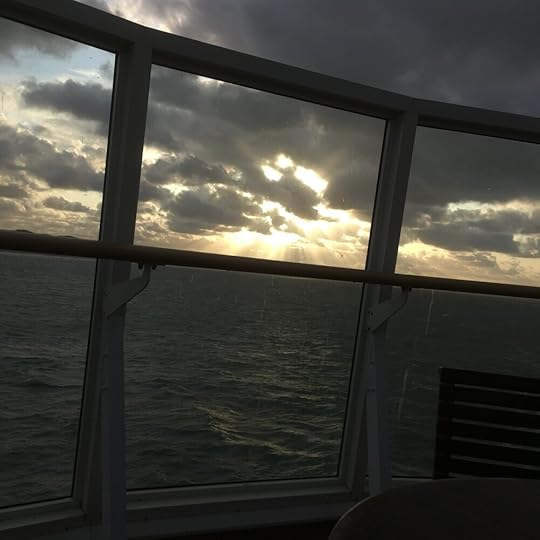
From our ferry on the channel crossing at dusk on our way to the NL…
We lost Thomas’ wonderful mom this week. She passed away after a brief battle with swift, aggressive cancer. We were able to get to the Netherlands in time to say goodbye and to have a last day with her. We grieve her deeply. She was a person whose gentleness, whose deep faith and warmth made a circle of love around her that sheltered other people. She drew them, us, into belonging in her home and life. You always hear about the rocky relationships between mothers and daughters-in-law, but I wouldn’t know a thing about it, because all I knew from her was a friendship, trust, and affection that dignified me as her son’s wife and made me her true companion.
I began writing this as an Instagram post, to let my readers know I’m taking a break for a bit as we process everything, but I found that I wanted to say two things that have been tumbling together in my mind over the past few days and they wouldn’t fit the IG word limit.
First.
Death is an outrage. It’s a travesty, a cosmic violence, a violation of our deepest being. It’s so profoundly unnatural, and to hate it, to weep, to grieve the theft of years of companionship and love is absolutely the right response. Jesus wept at the tomb of his friend and we weep at the gravesides of those we love and this speaks to our bone deep knowledge that we are crafted and created for life that burgeons and love that knows no parting and joy without limit or fear to taint its brilliance.
But you can grieve deeply and trust God at the same time because grief does not equal fear. And when Jesus’ wept at Lazarus’ tomb, when we weep here, it isn’t in a hopeless dread or passive despair. We grieve in profound, fierce hope, because death has been defeated.
Listen again and hear it well.
Death is defeated. It no longer has the last word or the final say. It cannot touch our real ending, our true identity. Oh death, where is your victory? Where is your sting?
One of the deep beliefs that shaped my mother-in-law’s life was her hope in the resurrection, her looking toward the return of Christ. It’s something she spoke often about, something that was real for her, real like dinner cooking on the stove, or grandbabies being cuddled, so that when this disease came upon her, even cancer, in its huge pain and ugliness and terror, it was transformed by her faith into a space where the unfailing life and healing, the coming of Christ to wipe every tear from our eyes was felt as present and real by everyone she encountered.
She held fast to Christ and she was surrounded in her final hours by all of us children who had been sustained and shaped by her hope, by Psalms read aloud in comfort, by prayer, by songs of worship sung by her family in sorrow but surety and that was her legacy. I have lived out this week the actual reality of those words of Paul that can seem so impossibly idealistic: ‘we do not grieve as those who have no hope’. But it’s true. We grieve as those who grip hope as the hand of Christ, the Spirit of life suffusing our bodies, and that is a wonder that irradiates the darkness of this broken world, the grief of this present loss. Such hope means tears and laughter. Affection and tenderness woven with sorrow. Such hope means determined, fierce trust in the ardent, unbroken brightness of love as it invades the darkness with a light that even death cannot comprehend.
On our drive down to the NL, Thomas and Lilian and I listened over and over again to two songs, a Dutch song called ‘Alles for Hem’, and Andrew Peterson’s ‘Is He Worthy?’. We basked in the strength brought by both because they were songs celebrating the ultimate truths, the final things we’ll know when Christ returns one day - tears wiped away, death finally banished, all the ‘sad things coming untrue’ as Sam Gamgee says. They were songs focused on the words of Revelation, in which the lamb who was slain is finally honoured above all.

The Lamb who was slain. Jesus, the Word through whom the universe came into being, wept on his way to offering his own holy self to death. Wept because death is awful. But it was his own offering, that gift of God’s own precious, tender, holy lamb that brought Lazarus back to life a few minutes after those holy tears were shed, that assures our victory.
Death is defeated because God came and bore it with us and because like the holy warrior he is, he beat it. He overcame the shadow realms of sin and death and hell. He is the victory and his victory means life reconnected to his own boundless, loving existence. It’s funny how the things you think you believe somewhere in the background of your life suddenly blaze out as the only truth by which you can survive this dark world in hope. But the truth is real, the love is real, the deathless hope is true.
And that precious lamb, as we sang over and over, is so worthy of blessing and glory and honour and power, and Susette, my precious mother-in-law, is singing those words without pain or sorrow or suffering now because the deathless one died and was raised. We live, even in the broken place, in the starlight shimmer, the unshakeable radiance of that reality. She knows it in full and we glimpsed it in her even as she died.
I’ll leave you with the song we sang on our way to keep vigil with her in death, with words that shimmer even now in my daily thought. May they impart the same hope and surety that they did to us:



